Working in partnership
Mercy Community Services (MCS) extends its sincere thanks to the Presentation Congregation Queensland for partnering with MCS in support of the Romero Centre. Sr Marlette Black pbvm, Congregation leader, said the Presentation Congregation Queensland was delighted to enter into a mission partnership with the Romero Centre.
“Presentation Sisters around the world are committed to meeting the needs of those made poor and to transforming the unjust structures that keep people poor. In Queensland, we are diminishing in our capacity to carry out active ministry. However we continue to have a strong desire and commitment to continue our mission by working in partnership with others. The Romero Centre works to support the needs of asylum seekers in Australia who are seeking safety and their basic human rights. The work done by the Romero Centre is very much aligned with the mission of the foundress of the Presentation Sisters, Nano Nagle, and the work of the Presentation Sisters in Queensland. It is a privilege to support the Romero Centre with financial resources and any other support we can offer to enable the Romero Centre to carry out its mission.”
Mercy Community Services CEO Elaine De Vos said it was thanks to partners such as the Presentation Congregation Queensland that the organisation is able to provide services to support people seeking asylum.
“The Congregation’s generous donation will have a significant impact on the lives of people seeking asylum, enabling the Romero Centre to continue to coordinate much-needed support services including access to safe accommodation, practical assistance, and pathways to training and employment. I thank the Congregation for supporting MCS in this missional partnership to improve the lives of people in need in our community.”

Pictured from left: Lisa Eastment – General Manager Mission Integration MCS; Sr Marlette Black pbvm – Congregation leader; Elaine De Vos – CEO MCS; Geoff Gowdie – Congregation Executive Officer; and Steven King – General Manager, Families and Young People MCS meet to discuss the partnership.
You too can make a difference for people seeking asylum. There are a number of ways you can get involved, from organising a fundraising event to coordinating a goods drive at your work, business, school or church. It’s fun, easy and rewarding to make a donation and assist in providing the right kind of support, when it’s needed the most. Your time and generosity is appreciated!

The Romero Centre is one way that Mercy Community Services is helping build a world where people, families and communities are strong in spirit, healthy and connected. Donations over $2 are tax deductible.
We are open from 9am to 4:30pm AEST Monday to Wednesday and Friday, Thursday from 9am to 1pm, (excluding public holidays).
Address: 8 Dutton Street, Dutton Park, Queensland 4102
Mailing Address: Romero Centre, PO Box 6188, Fairfield Gardens 4102
Phone: (07) 3013 0100
Telstra phone booths are free to call us. For urgent support please call Lifeline, DVConnect: 1800 811 811 or Homeless Hotline: 1800 474 753.

Let's stay in touch
Subscribe to our newsletter and stay up to date with all events direct to your mailbox.
Copyright © 2023 Romero Centre. All rights reserved.
Send us an email
Subscribe to our newsletter.
Type of place
School, Residence (group), House, Institutional / group housing
Victorian 1860-1890, World War II 1939-1945
Sisters of Presentation Convent
This is an image of the local heritage place known as Sisters of Presentation Convent
Sisters of Presentation Convent Zoom current image
This house was constructed circa 1885 for bank manager James Gibson as a marine residence. It became his permanent residence after his retirement in the 1890s, called ‘Culterfel’. The property was sold to John Henry Hart in 1911, a grazier who also used it as a holiday and retirement residence. Transferred to his trustees with power of sale in 1929, it was sold in 1935 to Archbishop James Duhig. Duhig already owned ‘Wyvernleigh’ across the road and established the St John Vianney parish there in 1930. After alterations ‘Culterfel’ became home to the Presentation Sisters and their school, which opened in 1941. It continues to serve as the Convent of the Sisters of Presentation.
Also known as
L89_RP33032 ; L90_RP33032
Local Heritage Place Since — 1 January 2004
Date of Citation — March 2015
People/associations
Criterion for listing, interactive mapping.
City Plan Interactive Mapping
The appeal of Manly as a bayside suburb grew in the 1880s with the subdivision and sale of the 151 acre ‘Manly Beach Estate’. The estate was also known as the ‘Wyvernleigh Estate’, after a residence which had been constructed there. Bank manager James Gibson was the first registered purchaser of allotments in the estate in 1882, and his purchases included this site, fronting Dallie and Waterloo Streets (now Oceana Terrace and Kooralgin Street). He added surrounding blocks to his holding in 1883 and 1885. During that time Gibson also had a marine residence constructed on the site. By 1885 the Queensland Times, Ipswich Herald and General Advertiser was calling attention to a sale of Manly Beach Estate allotments ‘in close proximity to the marine residence of our well-known townsman, James Gibson, Esq.’ Gibson’s house was included in the 1887 estate sale maps, opposite ‘Wyvernleigh’.
Gibson’s house ‘Culterfel’ was one of the first seaside holiday houses constructed in Manly. As manager of the Ipswich branch of the Bank of New South Wales, Gibson and his family primarily resided in Ipswich, but took their holidays in the Manly house. The demand for bayside holiday houses accelerated in the late nineteenth century, as wealthy Brisbane residents took advantage of the opening of railway lines to Brisbane’s bayside suburbs and an economic boom, to create vacation and retirement homes. Most of this development occurred at Sandgate and Shorncliffe, with growth at Wynnum and Manly following in the twentieth century.
Gibson had built ‘a mansion worthy of the site’, according to an 1887 advertisement in the Queensland Figaro and Punch . ‘Culterfel’ faced the bay, with verandas to take advantage of the view. It was slightly less elevated than ‘Wyvernleigh’ but its position was still considered ‘one of the best on the shores of Moreton Bay,’ with an ‘unobstructed and extensive’ view.
Gibson and his wife became the permanent residents of ‘Culterfel’ on his retirement in the early 1890s. After the death of his wife in 1898, Gibson removed to Brisbane and leased the Manly property, which included stables, a coach house and gardens. ‘Culterfel’ briefly became a boarding house in 1909 and 1910 before Gibson’s death in 1910. The property was then sold to John Hart, a Blackall grazier. Hart followed Gibson’s example, initially using ‘Culterfel’ as a holiday residence but later retiring to the property with his wife. The Harts took an interest in the local community, joining clubs and providing the house to host the Manly fete in 1912 and Green Island Scheme meetings in 1920. The house was also used as security for a significant loan of £50,194, which Hart took out in July 1920. The mortgage seems not to have been related to ‘Culterfel’ itself; Hart owned large holdings in western Queensland and the mortgage may have been associated with these. In the late 1920s the Harts removed to a residence in Ascot. The Hart Estate at Manly was offered for sale in 1927, and Hart died a year later in 1928.
‘Culterfel’ and its land, including lots 64 to 69 and 89 to 90, was purchased by Brisbane’s Roman Catholic Archbishop James Duhig in December 1935. Following his appointment as Co-adjator in 1912 and Archbishop in 1917 Duhig planned immense and unprecedented growth within the Church. Over one hundred Roman Catholic churches were constructed in the Brisbane Archdiocese between 1912 and 1928. As part of this growth scheme Duhig purchased large old estates in and around Brisbane, modifying the houses and adding to the sites churches, schools, convents and presbyteries. These included ‘Folkstone’ in Bowen Hills (Our Lady of Victories Catholic Church, 1925), ‘Mount Margaret’ in Wynnum (now Nazareth House) and ‘Wyvernleigh’, across the road from this property.
Manly was ripe for Duhig’s investment, with a growing population but a shortage of Catholic places of worship and education. Wynnum was the nearest worship centre for Manly’s Catholic residents, with a church for Sunday services and the Sisters of Mercy’s convent school providing non-secular education. It was not until Duhig purchased ‘Wyvernleigh’ in 1925 that a church was proposed for Manly. In 1930 the St John Vianney parish was established, ‘Wyvernleigh’ was demolished, and a presbytery erected on the site in 1936. ‘Culterfel’ also played a role in this progress. Although title to ‘Culterfel’ did not pass to Duhig until January 1936, the Archbishop appears to have taken possession of the house early, with ‘Culterfel’ becoming home to the parish priest, Rev Father Butler, in 1930. The lower level of ‘Culterfel’ was reportedly used as a mass centre pending the completion of the presbytery on the former ‘Wyvernleigh’ site. The house was also used for the parish’s social gatherings, holidays for poor children, and a wedding breakfast was held on the veranda in 1931. However, the parish’s use of ‘Culterfel’ appears to have declined over the course of the 1930s, after the presbytery and a church hall were built on the ‘Wyvernleigh’ site.
In 1940 ‘Culterfel’ was remodelled to provide a seaside convent for the Presentation Sisters. The alterations, which cost around £1,700, are likely to have been undertaken by architect Frank Cullen. Cullen trained with Hennessy, Hennessy and Co and ran an architectural firm with Desmond Egan from 1937 to 1941. He was also the Archbishop’s nephew and was responsible for the design of many interwar and postwar Catholic buildings, including the presbytery for the ‘Wyvernleigh’ site (1936), alterations to Mount Carmel Convent at Wynnum (1940), the second section of the Villa Maria Hostel (1940) and extensions to St Joseph’s Nudgee College (1950s).
The property was transferred to the Roman Catholic Diocese Trustees on 14 January 1941. Twelve days later, the St Philomena’s Convent and School was blessed and opened by Archbishop Duhig. It was home to the Order of the Sisters of the Presentation (or Presentation Sisters), who had arrived in Queensland in February 1900. The order focused on outreach, particularly education, and the Sisters established schools and convents in Longreach and central Queensland. Schools in Brisbane followed, including St Rita’s Convent School in Clayfield which opened in 1926, and the Church of Christ school in Graceville in 1937 (now Christ the King Catholic Primary School). A Catholic school for
Manly was foreshadowed by Duhig in 1930, and one of the order’s Queensland pioneers, Mother Ursula, helped select the Manly site in September 1940. Oral history suggests that the Sisters had moved into the Manly convent in December 1940, and the Catholic Leader of January 1941 stated that the Presentation Sisters were seeking school enrolments. The Sisters conducted the school from the convent site, opening with just over 80 students. The school was renamed St John Vianney’s Catholic Primary School and moved across the road to a purpose-built schoolhouse in 1953.
The Convent and its land were transferred to the Order of the Sisters of the Presentation in Queensland in 1959. The coach house, which stood along the Oceana Terrace frontage, was converted into a laundry and offices. A garage, chapel and aged care accommodation were added to the site in the 1970s and 1980s; these buildings are not included in the heritage overlay. The site continues to be owned by the Corporation of the Trustees of the Order of the Sisters of the Presentation in Queensland.
Statement of significance
Relevant assessment criteria.
This is a place of local heritage significance and meets one or more of the local heritage criteria under the Heritage planning scheme policy of the Brisbane City Plan 2014. It is significant because:
Criterion A
The place is important in demonstrating the evolution or pattern of the city's or local area’s history
as one of the first large holiday residences built in the Manly area in the nineteenth century.
Criterion B
The place demonstrates rare, uncommon or endangered aspects of the city’s or local area’s cultural heritage
as a rare surviving example of a large nineteenth century holiday and retirement residence built in Manly.
Criterion G
The place has a strong or special association with the life or work of a particular community or cultural group for social, cultural or spiritual reasons
as it has served as the Convent for the Presentation Sisters since 1941.
Department of Environment and Heritage Protection, Entry on the Queensland Heritage Register, Our Lady of Victories Catholic Church [601585]
Department of Natural Resources and Mines, Queensland Historic Titles
Brisbane Courier, Catholic Leader, Courier Mail, Longreach Leader, Queensland Times Ipswich Herald and General Advertiser, Queensland Figaro and Punch, Western Champion, 1883-1945
Brisbane City Council, Building Cards and Registers of New Buildings, 1936-1941
Brisbane City Council Department of Works Detail Plan No W 44
Brisbane City Council, City Architecture & Heritage Team, heritage citations
Brisbane City Plan 2014, aerial photographs 1946, 2012
Estate maps, Manly Beach and Wyvernleigh, 1883, 1887
History of the Presentation Sisters in Australia (website)
History of St John Vianney’s Catholic Parish (website)
History of St John Vianney’s Primary School (website)
Rev A Nolan, History of the Manly Parish (notes from the South Moreton Bicentennial Historical Collection)
Mervyn N Beitz, From Mangroves to Moorings
Citation prepared by — Brisbane City Council (page revised June 2022)

The continuation of the ethos of Nano Nagle and the Queensland Presentation Congregation in the documents of St Ursula's College, Yeppoon : a case study in document analysis
Number of pages, open access, thesis type.
- Doctoral Thesis
Usage metrics

- Other education not elsewhere classified

Structure Chart
Mercy partners.
St Ursula’s College, Yeppoon, is under the canonical sponsorship and civil ownership of Mercy Partners . The ministry was entrusted to Mercy Partners by the Presentation Congregation on 12 June 2014.
The Mercy Partners ministerial PJP assumes the role of the canonical sponsor of St Ursula’s College, Yeppoon. The civil relationship is that Mercy Partners Limited is the sole Member of the organisation that operates the Ministry. The day-to-day operations of St Ursula’s College, Yeppoon, remains under the governance of their Board.
Mercy Partners commits to ensure that their ministries flourish as Catholic ministries that contribute to the emergence of a world where the healing, liberating and life-giving mercy of God is experienced.
St Ursula’s College Board of Directors
In 1992, the Presentation Sisters incorporated the College as a Company, St Ursula’s College Limited, and established a Board of Directors. This was done with careful preparation and ongoing formation.
The Presentation Sisters, like many Congregations, faced the challenge of declining numbers and looked for a governance model to meet the needs of the future. When the decision was made to incorporate the College, the Sisters developed a constitution that provides for the governance of the College through an appointed Board of Directors. St Ursula’s College is thus a ‘stand alone’ Religious Institute School, unlike other Secondary Schools and Colleges in the Rockhampton Diocese that are controlled by the Diocesan Catholic Education Office (DCEO) and, ultimately, the Bishop. Of course, St Ursula’s enjoys valuable working relationships with the DCEO.
In June 2014, the Canonical sponsorship of the College was transferred from the Presentation Sisters to Mercy Partners. The College continues in the Presentation tradition under the guidance of the St Ursula’s College Board and with the dedication and commitment of the Principal, College Leadership Team and staff.
The College Board has a membership of 8 Directors:
- Mrs Ann Marie Pawsey MEdL, BA, DipEd, Grad Cert RE (Chair)
- Mrs Bridget Wells BA LLB GDLP (Director)
- Ms Jayne Maresse BBus (Accounting), CA (Director)
- Mr Tim Cole CA (Director)
- Mrs Julie Payne BCom (Acc), GradCertBusAdmin, GradCertEd, FCPA (Director)
- Mr Anthony Arnold BA LLB (UQ) DipModLang (UNE) (Director)
- Mrs Louise Cook BHLTSC, DAPPSC, GradCertComm&PrimHlthCareNsg, GradCertCritCareNsg, MACN (Director)
- Ms Gloria Malone AdvDipManagement (Director)
Ms Brenda Tooth; Company Secretary
Unless they choose otherwise, members remain on the Board for a maximum of nine years, served on a rotational basis.
College Leadership Team
- Principal – Deborah Ryan
- Business Manager – Peta Tomkins
- Acting Deputy Principal (Learning & Innovation) – Luke Tree
- Acting Deputy Principal (Students & Wellbeing) – Megan Slade
- Assistant Principal (Mission & Identity) – Kathy Strelow
- Assistant Principal (Student Outcomes) – Laura Kann
Middle Leadership Team
Heads of School
- Acting Junior School – Melissa Thomas [email protected]
- Middle School – Kelly Melvin [email protected]
- Senior School – Jodi Willing [email protected]
Heads of Department
- Arts & Instrumental Music Coordinator (Visual, Drama and Music) – Ms Shannon du Plessis [email protected]
- Acting Design & Technology + eLearning Coordinator – Mrs Nicole O’Neill [email protected]
- Mathematics – Mr Kevin Wallis [email protected]
- Science – Mrs Kim Reddy [email protected]
- Social Science (including Business and Library) – Mr Mark Avery [email protected]
- English – Ms Debbie Owens [email protected]
- Religious Education – Ms Dana Bedward [email protected]
- Health and Physical Education – Mr Daniel Ramirez [email protected]
- Languages – Mrs Emily Willis [email protected]
Head of Boarding – Debra Withnall [email protected] Head of Inclusive Education – Jenny Balanay [email protected] Head of Student Pathways – Jackie Bean [email protected] College Counsellor – Lisa Pyper [email protected] Acting Registered Training Organisation Manager – April Acworth [email protected] Sports Coordinator – Krista Vatubua [email protected] Community Officer – Katrina Whitham [email protected]
Parent Engagement Network
The Parent Engagement Network (PEN) is an integral part of the College community. Our PEN provides the opportunity for parents to share their opinions on issues relevant to the College and assist in improving the educational opportunities available for their children.
New and continuing parents and carers are encouraged to join the St Ursula’s PEN.
The Committee aims to:
- Keep parents and carers informed about educational issues;
- Provide a forum for exchange of information and for consultation and discussion;
- Promote parenting programs, parent/teacher interaction, and parent support;
- Foster a sense of belonging, i.e. parents as part of the College Community; and
- Support College activities through fundraising or attendance in an official capacity.
Executive Committee Members 2024
President: Maria Harms Vice President: Paula Osborne Secretary: Kellie Hill Treasurer: Colleen Cranny Boarders’ Representative: Sharryn Gilmour CSPQ Rep: Natalie Salisbury
St Ursula’s Parent Engagement Network Constitution

House System
At St Ursula’s College, each student belongs to one of four College ‘Houses’ for the duration of their enrolment: Kennedy (Green); Madden (Red); Nagle (Blue); and Shiel (Yellow).
The House system provides a structure for competition in Sporting and Cultural activities at St Ursula’s College. Smaller groups within each House also meet twice weekly for pastoral care activities and mentoring under the guidance of a staff member, in a set area. Students are encouraged to regard their House Group Teacher as their primary staff contact person. The House Group Teacher’s role is to take a special interest in the welfare of those students in the group and to report to parents on the general progress of those students in their care.
Where a student is experiencing difficulties, she could approach:
- The Subject Teacher (if the problem relates to a particular subject) or her House Group Teacher;
- Head of Junior School (Year 7 & 8), Head of Middle School (Year 9 & 10) or Head of Senior School (Year 11 &12);
- Deputy Principal (Students & Wellbeing), or Deputy Principal (Learning & Innovation)
At St Ursula’s College, Yeppoon, we cultivate an environment of belonging, so that each and every member of our community knows they are respected and welcome. A culture which empowers and encourages each student to seize leadership opportunities, know their self-worth, and reach their potential is evident throughout the College. Our staff are dynamic and dedicated professionals who specialise in the education of young women. A prominent and active well-being program supported by three Heads of School, a School Counsellor and a School Nurse, is based on the principles of Positive Psychology and Growth Mindset, and ensures that girls are well supported as they navigate adolescence.
The multicultural atmosphere of the College fosters a sense of belonging and inclusion among all students. Students and staff from various cultural backgrounds share their knowledge and skills within the College Community and are appreciated for their contribution to campus life. Harmony Day is celebrated annually, and the Cultural Captain, a Student Leader, works with staff to create opportunities to celebrate cultural awareness and acknowledge diversity in a respectful and affirming manner.
Quick links
Our curriculum, why choose an all girls school.

- Opportunities
- For Parents
- For Students
- Important Links
- International edition
- Australia edition
- Europe edition

Catholic orders take their lead from the pope and divest from fossil fuels
Exclusive: Four Australian Catholic orders are jointly and publicly divesting from coal, oil and gas: ‘We believe the Gospel asks no less of us’
Divesting from fossil fuels: open letter from religious leaders in full
Four Australian Catholic organisations have announced they are completely divesting from coal, oil and gas in what they say is the first joint Catholic divestment anywhere in the world.
The move comes as prominent Jewish rabbis, Muslim clerics, Anglican bishops and other religious leaders call on the Australian government to protect the Great Barrier Reef , stop approving coalmines and remove subsidies to the fossil fuel industry, in an open letter published by the Guardian .
The divestment announcement – the first by any Catholic organisation in Australia – and letter were coordinated by the multi-faith group the Australian Religious Response to Climate Change, in partnership with the environmental group 350.org.
It comes a year after Pope Francis, in his second encyclical, Laudato Si’ , called on all people – not just Catholics – to take “swift and unified global action” to protect the environment and stop global warming. It is part of Laudato Si’ week, in which Catholic organisations around the world discuss their role in tackling climate change.
At the time the papal intervention was labelled “ explosive ” and “ the most astonishing and perhaps the most ambitious papal document of the past 100 years ”.
The four Catholic orders publicly divesting are: Marist Sisters Australia; Presentation Congregation Queensland; Presentation Sisters Wagga Wagga; and the Passionists – Holy Spirit Province Australia, NZ, PNG and Vietnam.
Thea Ormerod, the president of the Australian Religious Response to Climate Change, told the Guardian it was a significant step for Catholic organisations to publicly announce they were divesting from fossil fuels.
“They’re often happy to make lifestyle changes, to take responsibility in their own congregations for a lighter carbon footprint,” she said. “But going out and saying what they’re doing is a bit against the culture of the organisation. The nature of the organisation is quite different – it’s a private spirituality.”
Ormerod said her organisation had been working with Catholic groups – as well as other faith groups – encouraging them to take a public stance, treating environmental issues the way many religious groups have approached Australia’s detention of asylum seekers.
Since the pope issued his encyclical a year ago, Ormerod said her job had become much easier. “[The pope] saying our need to move away from fossil fuels is urgent – that’s quite powerful. Sometimes parishioners have been told by the parish priest, ‘No, that’s too political – it’s not aligned with Catholic values.’ No priest can say that now.”
Father Thomas McDonough from the Passionists said his congregation had been aware of the need to be “ecologically responsible” for years. “Pope Francis, in his Laudato Si’, crystallised for us the level of responsibility we need to take as a congregation – the urgency for action ever more apparent,” he said.
“So we trustees of the Passionists took the decision to begin diverting our investments from fossil fuel extractive industries and into renewable energy. We believe the Gospel asks no less of us.”
The amounts of money the groups have is unlikely to be significant, but Ormerod said the symbolism was of enormous significance. “What it’s going to do is say to other Catholic organisations, ‘Hey, this is something we should be doing,’” she said.
“If it’s not moral to be burning fossil fuels, we shouldn’t be extracting them from the ground or profiting from that. It’s an extension of the principles and values that Pope Francis talked about.”
In the multi-faith open letter, the signatories criticise the commitments to counter climate change made by Australia’s Liberal and Labor parties. It reads: “So far, the election debates have failed to assign due priority to global warming. While Labor’s policies are more ambitious in some areas, Labor remains supportive of subsidies to fossil fuel companies. Neither of the major parties currently plan to wind back coal and gas mining.”
- Fossil fuel divestment
- Catholicism
- Pope Francis
- Climate crisis
- Fossil fuels
Comments (…)
Most viewed.

- UK & Ireland
- US & Canada
- Obituaries & Tributes
- Justice, Peace & Environment
- Youth & Young Adults
- Reflections & Homilies
- Gospel in Art
- Art, Theatre, Music & Shows
- Films, TV & Radio
- Forthcoming Events
- Regular Events
- Courses & Voluntary Work
- Retreat, Spirituality and Pilgrimage Centres
- Businesses, Accommodation & Travel
- Catechist Resources
Privacy and Cookies Policy
Website Terms of Use
- Website Updates
Four Catholic congregations to divest from fossil fuels on anniversary of Laudato Si'
- Jun 16th, 2016

Coal-fired power station in Poland
Today, four Catholic religious congregations announced that they are selling their investments in coal, oil and gas companies as the moral case against fossil fuels continues to build. The first-ever joint Catholic divestment announcement marks the commemoration of the first anniversary of Pope Francis' encyclical Laudato Si, which calls on the responsibility humans share in caring for the planet, our common home.
The Marist Sisters Australia, Presentation Congregation Queensland, Presentation Sisters Wagga Wagga, and The Passionists - Holy Spirit Province Australia, New Zealand, Papua New Zealand and Vietnam, are the congregations that have decided to abandon fossil fuels and embrace renewable energy. More Catholic organisations are anticipated to announce a pledge to begin a divestment process in celebration of the Feast of St Francis, in October.
In committing to divest, these organisations join over 530 institutions globally, representing over $3.4 trillion in funds under management. They include the World Council of Churches, the Norwegian Sovereign Wealth Fund, the Rockefeller Brothers Fund, Stanford and Oxford Universities, the Australian Capital Territory, the City of Newcastle and the Royal Australian College of Physicians.
Throughout the world, other Catholic institutions including Georgetown University, University of Dayton, Trocaire, Franciscan Sisters of Mary and more already committed to divest. The Global Catholic Climate Movement just announced a "Catholic Divest-Reinvest Online Hub" to house Divest-Reinvest news and resources for the Catholic community.
It is expected that more Catholic organizations will follow these steps, in consonance with the words of Pope Francis' encyclical: "We know that technology based on the use of highly polluting fossil fuels - especially coal, but also oil and, to a lesser degree, gas - has to be progressively replaced without delay".
This ask was to move away from fossil fuels was emphatically stressed by a 2015 statement of Catholic Bishops from all continents, who asked to "Put an end to the fossil fuel era... and provide affordable, reliable and safe renewable energy access for all". That is why Catholic organizations are also starting to collaborate with a new civil society campaign that seeks to end energy poverty by ensuring universal access to clean, renewable and affordable energy by 2030. The campaign, comprised of leaders from the global development, faith, philanthropy and health sectors, is to be launched at COP22 in Marrakesh (November 2016).
Across the world, Catholic parishes and communities celebrate the encyclical's anniversary with the Laudato Si Week, which includes a series of online conferences and local events to deepen the discussion of their role in caring for the planet and tackling climate change.
Quotes from relevant faith leaders:
"Marist Sisters in Australia are working towards divesting from fossil fuels. Dependence on fossil fuels is contributing to adverse climate change which affects everyone but especially the poor and vulnerable. In his encyclical, Laudato Si, Pope Francis calls on us to reduce carbon emissions and develop sources of renewal energy. Divesting of fossil fuels is one way that we can be stewards of God's gift of creation so that life in all its forms can be sustained now and into the future." said Sr Catherine Lacey SM, Congregation Leader, Marist Sisters, Australia.
"We recognise our need to engage in respectful and transformative relationships with the whole community of life. For many years Queensland Presentation Sisters have excluded any investment in our portfolio held with companies primarily associated with fossil fuels, uranium mining and environmental degradation. This is a key part of the way we engage in God's mission, especially at a time when the challenge to address global warming is so urgent," said Sister Marlette Black, Congregational Leader, Presentation Congregation Queensland
"We made the decision to align our investments with projects that reflect our values and understanding of the importance of caring for creation. The decisions are made after much careful consideration and in the knowledge that our decision won't change things overnight - this is a long term investment in the earth's future," said Anne Lane, Leader of the Presentation Sisters Wagga Wagga.
"For some years now our Passionist Congregation has been aware of the need for our communities and ministries to be far more ecologically responsible. Pope Francis, in his Laudato Si, crystallised for us the level of responsibility we need to take as a Congregation, the urgency for action ever more apparent. So we Trustees of the Passionists took the decision to begin diverting our investments from fossil fuel extractive industries and into renewable energy. We believe the Gospel asks no less of us," said Father Thomas McDonough CP, Provincial of The Passionists - Holy Spirit Province Australia, NZ, PNG & Vietnam.
"These congregations mark the beginning of a new momentum for the Catholic Church. Pope Francis' encyclical highlights that politics and business have been slow to react in a way commensurate with the urgency of the challenges facing our world. Through divestment from fossil fuels and reinvestment in clean energy, Catholic institutions are starting to use their financial resources to live Laudato Si", said Tomás Insua, Founding Coordinator of the Global Catholic Climate Movement.
"These divestment commitments represent an important step towards fulfilling the promise and the call of Laudato Si. Pope Francis and other faith leaders have spoken boldly about the need for climate action, and the time to act has arrived. That's exactly what these four congregations have done", said Rev. Fletcher Harper, Executive Director of GreenFaith.
Tags: divestment announcemen , fossil fuels , Laudato Si , Marist Sisters Australia , New Zealand , Pope Francis , Presentation Congregation Queensland , Presentation Sisters Wagga Wagga , The Passionists Holy Spirit Province Australia
Share this story
Recent popular stories.

Canon Roddy Johnson RIP
Apr 6th, 2024

Pilgrimage: The Road to Post-Secular Spirituality?
Apr 5th, 2024
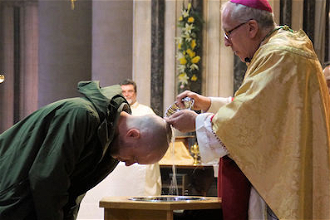
Why do adults decide to join the Catholic Church?
Apr 3rd, 2024

We offer publicity space for Catholic groups/organisations. See our advertising page if you would like more information.
We Need Your Support
ICN aims to provide speedy and accurate news coverage of all subjects of interest to Catholics and the wider Christian community. As our audience increases - so do our costs. We need your help to continue this work.
You can support our journalism by advertising with us or donating to ICN .
Saint of the Day

Tell us what emails you'd like:
© Independent Catholic News 2000-2024
Funding & Partnerships
YAC is mainly funded through government grants but seeks funding from a range of philanthropic and other sources. In today’s tight and competitive fiscal climate we are always looking to identify opportunities for potential partnerships, including with the corporate sector, to support service to young people in need.
We see great potential in partnering which enables those who are interested in assisting young people, but who are not sure how to best target their resources, with a focus for that support.
If you, your business or employer would be interested in partnering or supporting YAC in some way – please contact our CEO on 3356 1002 or [email protected]
YAC thanks all its funding bodies and partners for their ongoing support in the delivery of services for the young people we work with.
Government funding.
As a community legal centre, YAC’s legal services are funded through the National Partnership on Legal Assistance Services, whereby the Commonwealth Government and State/Territory governments jointly fund legal services.
We also receive government funding for our Youth Support and Family Support services.
Other grants
YAC would like to acknowledge the support of the Lady Bowen Trust in funding our youth support services, particularly our accommodation support. You can read more about the Lady Bowen Trust here.
The grants applied for and received during financial years is reported in our annual reports. We thank those awarding the grants for valuing the work which YAC does by providing these additional monies for particular projects or resources.
Presentation Congregation Queensland
We would like to thank the generous and ongoing support from the Presentation Sisters Congregation of Queensland that allows us to increase our services that provide support to vulnerable young people.
Commercial partnerships
We welcome partnerships with commercial organisations who are interested in assisting young people.
Services partnerships
Our Community Co-Responder program is delivered alongside KYC.

Youth Empowered Towards Independence (YETI) is a support agency for young people aged 12-25 years old living in Far North Queensland.
YETI currently employs a multidisciplinary team of teachers, social workers, community development workers, counsellors and psychologists. We believe strongly in recruiting practitioners from Aboriginal and Torres Strait Island backgrounds.


Pumicestone Indigenous Education & Employment Council
Our Bribie Island outreach program is delivered in partnership with the Pumicestone Indigenous Education & Employment Council (PIEEC).
Make a donation - change a life
Many young people in Queensland need support and assistance to get their lives back on track
We're calling on our community to come together to fund additional workers and resources to provide this support.
Follow us on social media for information on laws, youth rights, and news.
Contact YAC
Street address: Level 4, 16 Peel Street, South Brisbane Q 4101
Mailing address: Level 4, 16 Peel Street, South Brisbane Q 4101
Tel: (07) 3356 1002
Bussiness hours: 9am - 5pm, Mon - Fri
Send a message here
If you need urgent assistance outside of these hours:
- Youth Legal Advice Hotline 1800 527 527 (Mon to Thurs 8am - 9pm, Friday 8am to Sunday 5pm)
- Kids Helpline 1800 551 800 (24/7, 365 days per year)
- Lifeline 13 11 14 (24/7, 365 days per year)
- Homelessness Hotline 1800 474 753 (24/7, 365 days per year)
- If you are over 18, and seeking access to Mental Health Services in Queensland, Acute Care Team on 1300 MHCALL (1300 64 2255).
Advertisement
Free Newsletters
Sign up now
Year-old Laudato Si' has stirred up action for Earth
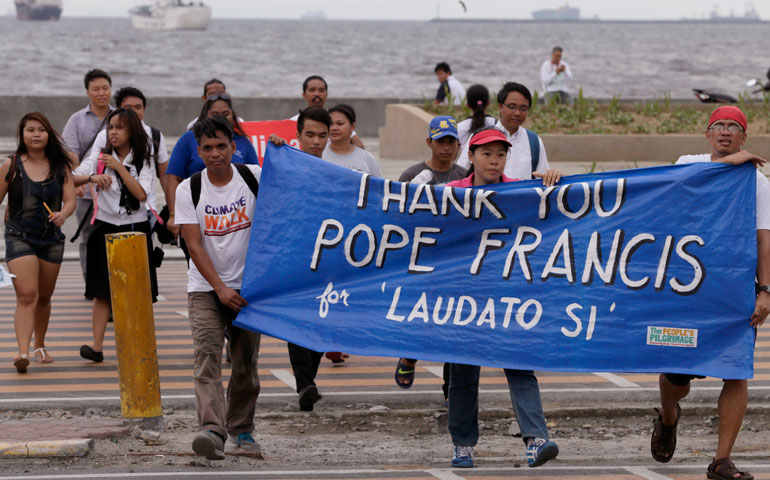
by Brian Roewe
NCR environment correspondent
View Author Profile
Follow on Twitter at @brianroewe
Join the Conversation
Last year's arrival of Pope Francis' encyclical " Laudato Si' , on Care for Our Common Home" marked a significant moment as the Catholic church substantially entered the realm of environmental concern at a time when global attention toward the Earth's degradation, in particular by climate change, was nearing a peak.
Since then, signs of the encyclical's impact have already appeared. Many parishes, schools and communities have studied, reflected and discussed the text, often through multidisciplinary conferences and much as Francis requested in its introduction: "I would like to enter into dialogue with all people about our common home."
More ambitious corners began taking first-step actions at institutional levels by forming green teams, improving energy efficiency and reducing wasteful consumption. For those long engaged in environmental issues, the encyclical proved a valuable rallying tool, one that opened doors, spurred mobilization and generated not-seen-before excitement within Catholic circles.
"I cannot wish for anything better," said Cardinal Peter Turkson, president of the Pontifical Council for Peace and Justice, which oversaw the first draft of the encyclical. Since its publication last June 18, Turkson has served as its chief promoter, traveling across the globe to deliver countless talks on Laudato Si' .
"I think it has proven to be really transformative," said Tomás Insua, co-founder of the Global Catholic Climate Movement. "But there's definitely a long way to go to really get this encyclical to really sync in our Catholic identity and really drive transformational change."
Out of the gate
While few anticipated the encyclical would yield immediate, far-reaching changes, it produced some out-of-the-gate impacts. For one, Francis placed environmental concern on the Catholic calendar by designating Sept. 1 as the annual World Day of Prayer for the Care of Creation.
Within nations, Turkson pointed to several African countries that have organized around the encyclical to move away from fossil fuels and forests as energy sources and adopt solar technology.
The Philippines church -- residing in one of the most climate vulnerable regions and long active in environmental issues -- organized rallies, petition drives and prayer services around the encyclical . As part of global "Break Free from Fossil Fuels" events in May, Lipa Archbishop Ramon Arguelles led a 10,000-person march against new coal-fired power plants.
Last year, the Federation of Asian Bishops' Conferences established a climate desk. In Brazil, bishops are planning a " Laudato Si' road show" for later this summer.
More: " Laudato Si' Week renews awareness ahead of encyclical anniversary " (June 14, 2016)
As positive efforts proceeded, so too did the realization of the degradation Francis described, said Joan Rosenhauer, executive vice president of U.S. operations for Catholic Relief Services. Recent trips that Rosenhauer took to the Philippines, where storms have worsened in the central islands, and Nicaragua, where warmer temperatures have disrupted growing seasons, showed how people are dealing with already-present effects of climate change.
"They're going to have to live their lives differently," she said.
In the U.S., numerous dioceses have undertaken their own encyclical implementation efforts. In Atlanta and San Francisco , they've formed preparatory plans. More concrete steps are underway in Chicago, where the archdiocese is pushing energy efficiency in its buildings , and San Diego, which has encouraged all parishes to install solar-power systems.
"Things are just popping up all over the place," said Dan Misleh, executive director of the Catholic Climate Covenant.
A Yale/George Mason survey at the encyclical's six-month mark found one in three Catholics acknowledging a papal influence on their views of global warming. A quarter of them were aware of Laudato Si' , and there were increases of 11 percentage points and 20 percentages points in becoming worried about global warming (64 percent) and believing it will harm the poor (62 percent), respectively.
A survey released Monday from the Center for Applied Research in the Apostolate at Georgetown University also found a third of Catholics having heard of or read the encyclical -- a percentage that has roughly held steady since July 2015. On the flipside, the CARA survey found 56 percent of those polled were not aware of the document. Still, six-in-10 Catholics agreed that climate change was occurring and largely a result of human activity. Additionally, 68 percent of Catholics (63 percent of U.S. adults) recognized a personal moral responsibility to address climate change, with 32 percent of Catholics saying the pope strengthened that belief; 68 percent reported no papal influence on their moral views regarding the climate.
On the international scene, maybe the encyclical's greatest impact came at the Paris climate negotiations in December. There, Laudato Si' "played a key role," said Turkson , a member of the Vatican delegation at COP 21 , the United Nations climate change conference. The Vatican received credit, along with other faith groups and island nations, for its endorsement of the Paris Agreement attaching a 1.5 degrees Celsius target to its central 2-degrees (3.6 degrees Fahrenheit) commitment to limit average global temperature rise.
Mobilizing Catholics
Beyond Holy See intervention, the encyclical helped mobilize 900,000 Catholics to sign the Catholic Climate Petition (which included the 1.5 degrees target) and 40,000 Catholics to join Global Climate March rallies ahead of the Paris summit. Amid both those efforts was the Global Catholic Climate Movement, itself an anticipatory response to Laudato Si' in its formation ahead of Francis' January 2015 visit to the Philippines.
The network, which began with 19 member organizations and now counts 300-plus, organized and delivered the Catholic Climate Petition to key leaders at the Paris climate talks.
The COP 21 mobilization "would have been absolutely impossible without the encyclical," Insua said.
The type of cooperation demonstrated in the Global Climate March, with religious and secular groups joining as a single force, can be attributed in some part to the encyclical, said Lorna Gold, head of policy and advocacy for Trócaire, the Irish Catholic development agency.
Gold, who has 14 years in policy advocacy, said the encyclical has given "a real boost" to the climate movement both within and outside the church, especially in uniting fronts along shared interests.
"You can see a convergence between the more secular actors and the faith-based actors on a number of big issues in the encyclical," she said.
That convergence marks a stark change from past interactions, where Gold described Catholic agencies more left "out in the cold" on broader discussions of human rights and environmental issues. The encyclical has changed that, she said, with Catholic groups experiencing a "sea change" in the role they play in civil society, where they now act as quasi-gatekeepers for Francis, viewed as one of the most influential leaders on global environmental issues.
While the agenda of a more sustainable global society has existed for years, it's becoming clear, Gold said, that the necessary transformative changes in policy, lifestyle and consciousness cannot happen without greater collaboration among individual initiatives.
"What Laudato Si' has done has made us look at, well, first the urgency and the depth of the challenge that we're facing, but also to think that we won't be able to do this unless we do it together," she said.
More: " Irish conference hears message: Climate action requires 'new era of solidarity' " (June 30, 2015)
Gold added that the pope "has really thrown open the agenda. ... It's almost like he said the unsayable," and broadened the accessible public policy discussion for Catholic agencies.
One door he's opened wider is the issue of fossil fuel divestment. A favorite citation of activists has been Paragraph 165, where Francis states the need to move away from "highly polluting fossil fuels ... without delay."
Those types of divestment ideas weren't being discussed much in the mainstream pre-encyclical, Gold said. Trócaire has committed to divesting their stock pension plans from fossil fuels in the next two years and is engaging Irish dioceses and universities in the divestment conversation.
On Thursday, four Pacific-area religious orders announced they will divest from coal, oil and gas companies. According to Global Catholic Climate Movement, the decision was the first-ever joint Catholic divestment announcement. The divesting orders are the Marist Sisters Australia, Presentation Congregation Queensland, Presentation Sisters Wagga Wagga, and the Passionists of the Holy Spirit Province Australia, New Zealand, Papua New Zealand and Vietnam.
"This is a key part of the way we engage in God’s mission, especially at a time when the challenge to address global warming is so urgent," said Presentation Sr. Marlette Black, congregation leader of the Queensland Presentation sisters, in a statement.
The joint divestment announcement was a result of a working group recently formed by Global Catholic Climate Movement. Insua said as that group develops and organizes, he anticipates more Catholic orders and institutes will follow suit in divesting in the next two years, beginning with another expected joint pledge in October near the Feast of St. Francis (Oct. 4).
More: " Dayton divestment conference delves into ways to leave fossil fuels behind " (Nov. 12, 2015)
Turkson told NCR he has heard the conversations around divestment pick up among religious orders, but so far, those haven't developed similarly in the Holy See.
"There's not yet been any policy from the Vatican against any such investment," he said.
While Francis urges a shift from fossil fuels, Turkson recognized the message comes off as corrosive in regions highly reliant on coal mining , such as Poznan, Poland, which he visited in November. The pope's intent, Turkson said, is "a gradual weaning" as alternatives develop, and not one that leaves masses of people instantly without wages or work.
The people lead
Despite noticeable progress, those engaged in environmental issues say there's still much to do in terms of bringing the encyclical to life. While many bishops wrote or spoke about the encyclical in the days and weeks after its release (Catholic Climate Covenant counted nearly 100 in the U.S. in the first month), Insua said only a few bishops' conferences have really raised the environment to central issue status.
That means not only writing statements, he said, but engaging in advocacy, specifically "for bold climate action." He predicted that step would only come if the people lead their prelates toward it.
"I think that the bishops of many countries will follow when they see that the Catholic grassroots are taking action by themselves," Insua said.
Gold senses "a nervousness" among the Irish hierarchy and clergy, who may feel out of their element on environmental issues. She and others have suggested a synodal process on the environment as one channel to more immerse Laudato Si' into the heart of the church, or including those discussions as part of the rumored synod on peace.
Misleh of Catholic Climate Covenant said he was pleased by the work he saw at the U.S. Conference of Catholic Bishops, which produced prayer and study guide resources for the encyclical, in addition to continued advocacy on Capitol Hill for full U.S. funding of the Green Climate Fund and national carbon standards on coal-fired power plants via the Clean Power Plan .
"Nobody can say that their resources haven't expanded exponentially in this area," he said.
At the same time, Misleh also acknowledged one of the biggest challenges is developing a greater comfort with the encyclical among clergy and lay leaders.
To that end, the Catholic Climate Covenant is developing a pastoral training program to help pastors become more comfortable discussing the encyclical and the theology behind caring for creation and addressing environmental issues. A similar effort is underway between Trócaire and the Irish bishops' conference.
In addition, the Global Catholic Climate Movement plans to expand its Laudato Si' animator program from the 500 people in 60 countries it's trained to mobilize local advocacy efforts. Likewise, Catholic Climate Covenant hopes to grow its ambassador network of encyclical speakers and is working on separate programs reaching out to Latino communities and church facilities managers.
As far as the long-term impact, Turkson placed Laudato Si' into the larger compendium of social encyclicals, describing them together "like a big river," with new tributaries forming as it flows forward. Like past encyclicals, such as Rerum Novarum , it too will stimulate future teachings and ideas, he said.
"But it is forever going to inspire the church's teaching on ecology and integral ecology."
[Brian Roewe is an NCR staff writer. His email address is [email protected] . Follow him on Twitter: @BrianRoewe .]
Editor's Note: Want more stories from Eco Catholic? We can send you an email alert once a week with the latest. Just go to this page and follow directions: : Email alert sign-up .
Latest News
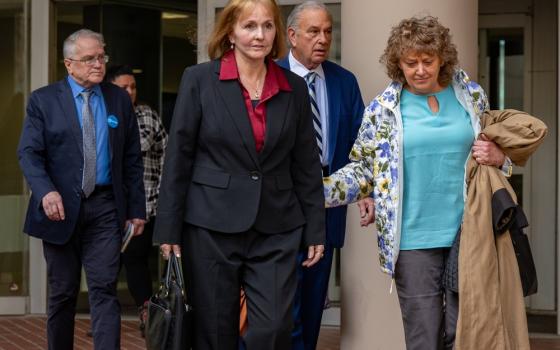
Victim-survivors address court in Archdiocese of Baltimore's bankruptcy process
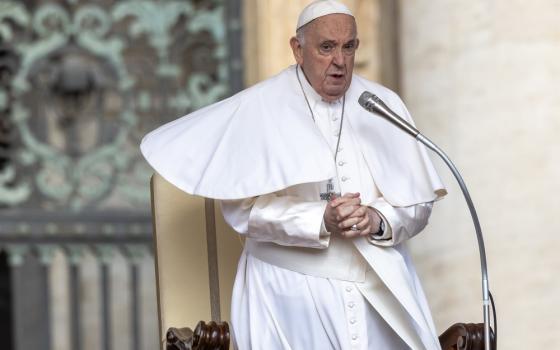
Take evil seriously, pope says at general audience

New York Catholic Workers bring new growth with rooftop garden
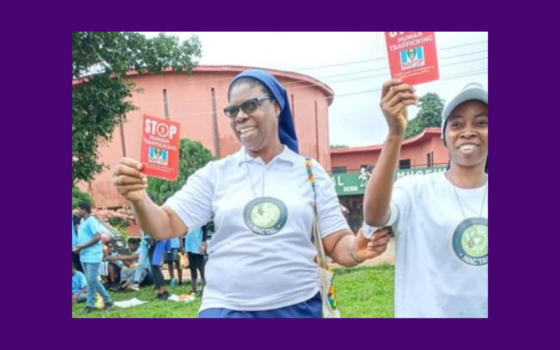
Nigerian sister honored for work against human trafficking
Subscribe to ncr's free newsletters.
Select any of the newsletters below, then enter your email address and click "subscribe"
- Congregations
- Executive Team
- Presentation People
- Welcoming the Stranger
- Gathering Of Presentation People
- Catholic Sisters Week
- Online Enrichment Opportunities
- Yes We CAN Food Drive
- Gathering Minutes & Materials
- Gathering Photos
- Gathering Reflections
- Laudate Deum 2024 Reflection
- Season of Creation 2023
Our History
Nano Nagle Founds Presentation Order
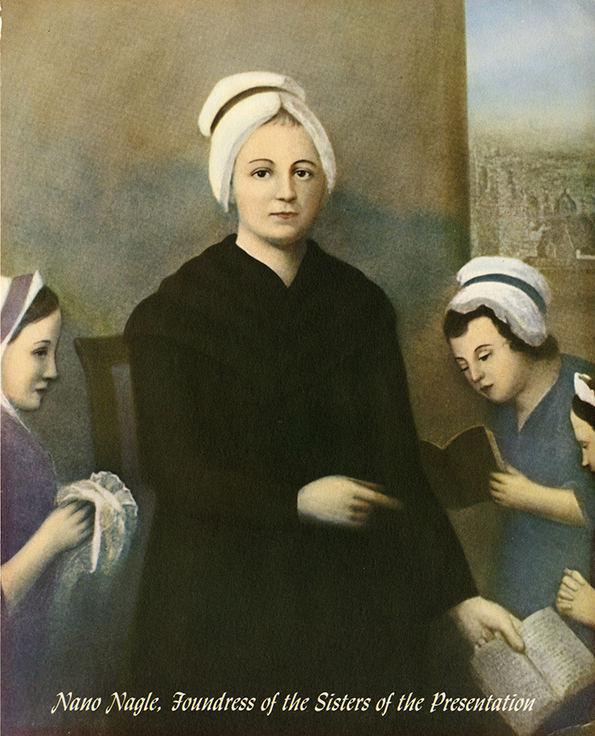
The Sisters of the Presentation of the Blessed Virgin Mary were founded by Nano Nagle in Cork, Ireland, for the purpose of educating poor children.
Presentation Sisters Expand into North America
Four pioneering sisters carried Nano Nagle’s vision and spirit to the shores of Newfoundland, the first Presentation congregation in North America.
Presentation Sisters Respond to Call in North America
Ten communities of Presentation Sisters were founded in North America over a 57-year period.
Invitation to Collaboration
Pope Pius XII invited the North American religious communities to converge at the University of Notre Dame, Inidiana, with the intention of encouraging stronger connections within and among them.
Beginning of Conference of Presentation Sisters
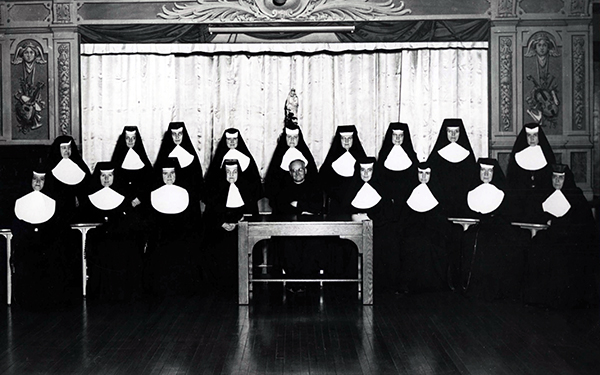
The Conference of Presentation Sisters began under the title of North American Conference. A meeting was held at Mount Loretto Motherhouse in Dubuque, Iowa and ten Presentation communities began to communicate on issues of ministry, spirituality and social justice.
Meeting of Presentation Superiors General
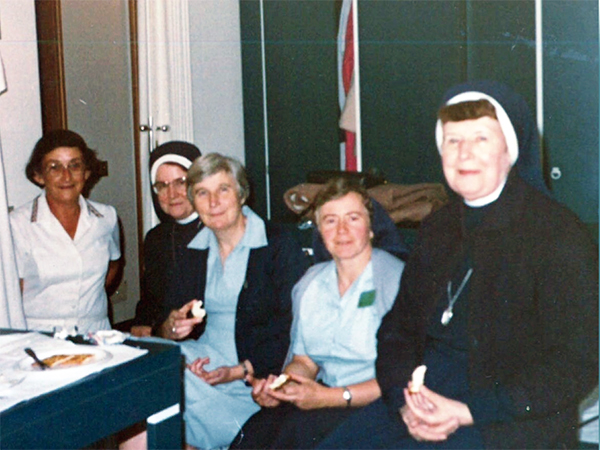
Presentation Superiors General met in Rome to discuss ways to promote a worldwide concept of Presentation life and mission and to establish more visible links between Presentation Sisters throughout the world.
First International Assembly
Collaboration went beyond North America with the first international assembly of the Presentation Sisters in Melbourne, Australia.
The International Presentation Association is established
After many meetings and the establishment of a coordinating team, each congregation indicated their willingness to be a prt of the International Presentation Association. IPA was ritually established at a liturgy, prepared by the Indian Sisters and celebrated in every community on April 26.
First IPA Assembly is held in Perth, Australia
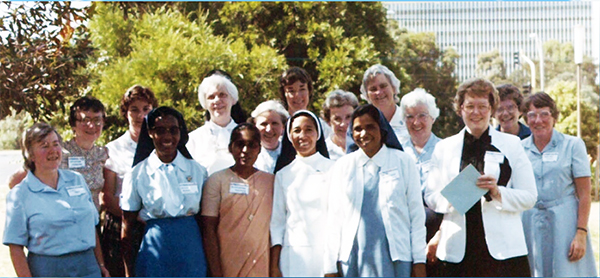
New Windsor Congregation Forms
Fitchburg, Mass. and Newburgh, NY congregations merged to create New Windsor Presentation Congregation. With this merger, the Conference now consisted of eight congregations. Watervliet, NY chose not to belong to the Conference.
NAC Becomes CPS
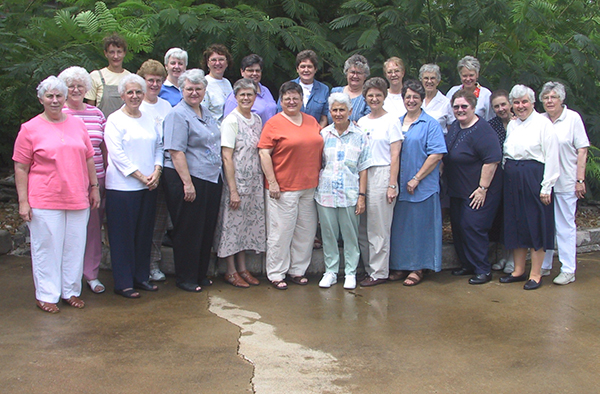
North American Conference (NAC) became Conference of Presentation Sisters of North America (CPS). The new structure included executive director and executive team, consisting of three members of the Conference. Sister Monica Miller (San Francisco) served as executive director.
Monica Milled Hired as Executive Director
Monica Miller was hired as the first Conference executive director. Her role was to build relationships, set up and office and prepare for the Convergence. She would leave this position following the Convergence of 2006.
Collaborative Ministry
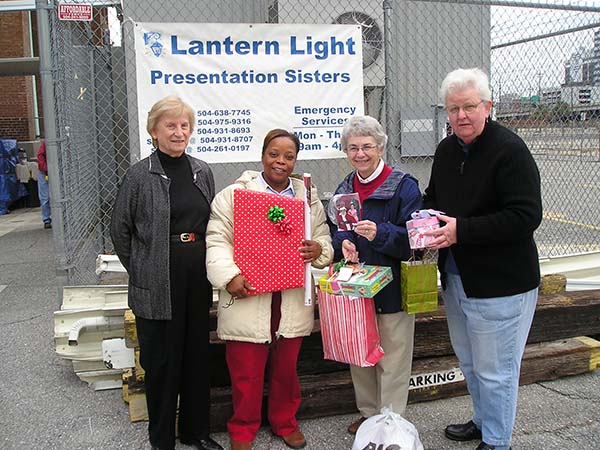
The eight congregations of the Conference began a collaborative ministry project. The common values of living among the poor and living simply lent themselves to a collaborative ministry in New Orleans, Louisiana called Lantern Light.The collaborative aspect of this ministry meant all the congregations shared funding responsibility and sisters serving in ministry there. Hurricane Katrina shifted some of the ministry focus, but the sisters were able to adjust their ministry presence to meet the immediate needs of the area.
Convergence in St. Paul, Minnesota

The Convergence gathering was held in St. Paul and brought together over 400 Presentation Sisters and their lay associates. Time was spent in meetings, prayer, music, conversations and general rejoicing.The gathering ended with renewed enthusiasm and commitment to carry on the mission of Jesus as it was exemplified in the life of Nano Nagle, foundress of the Presentation Sisters. Over 125 recommendations for further collaboration were presented to the leaders of the Conference for consideration.
Executive Assistant Hired
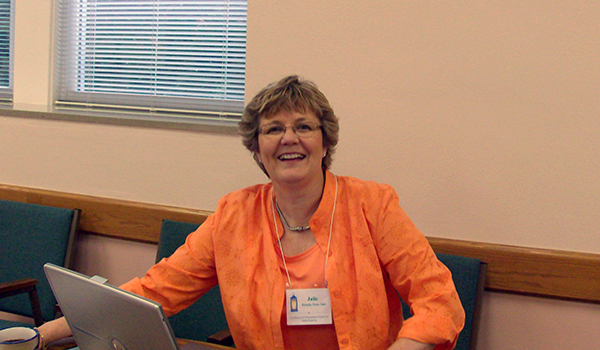
The Conference added Fargo Associate Julie French as executive assistant to support the executive team of the Conference. The leadership structure now includes a three-member executive team and the executive assistant.
Lisa Olson Hired as Conference Coordinator
Lisa Olson was hired as Conference coordinator to replace Julie French. Lisa had previously worked with the Aberdeen Presentation Sisters.
Eco-Spirituality Retreat
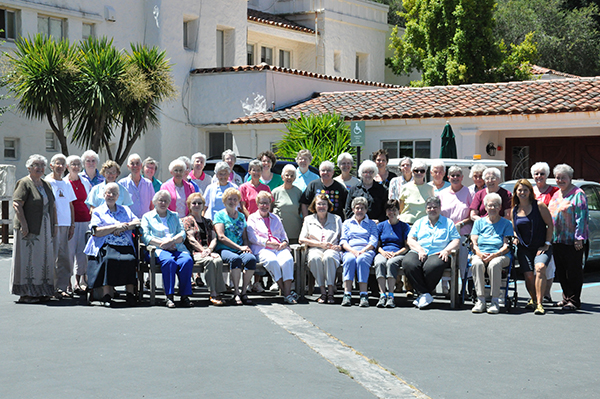
In 2014 the Conference sponsored an eco-spirituality retreat in Los Gatos, California. Every Conference congregations was represented in participants.
Gathering of Presentation Sisters, Brookings, S.D.
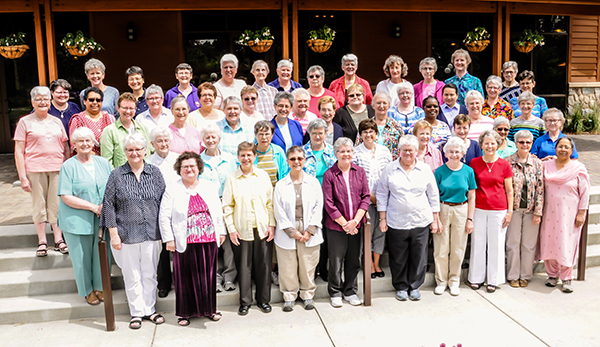
A Gathering of Presentation Sisters was held in Brookings, S.D. The purpose of this gathering was to bring together younger members to explore possibilities for the future. Over 50 sisters attended.
Hilton Grant for Online Formation
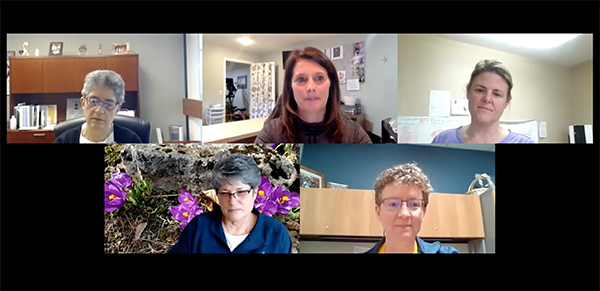
The Conference secured a three-year grant from the Conrad N. Hilton Foundation for the development of a collaboration online formation program for Presentation People.
Sign Up For Updates!
By signing up to receive our newsletter, you will stay informed about upcoming events, news, and new resources.
June 16, 2016
Catholic organisations say no to fossil fuels, marking anniversary of Pope’s encyclical
GLOBAL – Today, four Catholic organisations announced that they are selling their investments in coal, oil and gas companies as the moral case against fossil fuels continues to build. The first-ever joint Catholic divestment announcement marks the commemoration of the first anniversary of Pope Francis’ encyclical Laudato Si, which calls on the responsibility humans share in caring for the planet, our common home .
The Marist Sisters Australia, Presentation Congregation Queensland, Presentation Sisters Wagga Wagga, and The Passionists – Holy Spirit Province Australia, New Zealand, Papua New Zealand and Vietnam, are the congregations that have decided to abandon fossil fuels and embrace renewable energy. More Catholic organisations are anticipated to announce a pledge to begin a divestment process in October in celebration of the Feast of St Francis.
In committing to divest, these organisations join about 530 institutions globally, representing over $3.4 trillion in funds under management. They include the World Council of Churches, the Norwegian Sovereign Wealth Fund, the Rockefeller Brothers Fund, Stanford and Oxford Universities, the Australian Capital Territory, the City of Newcastle and the Royal Australian College of Physicians.
Throughout the world, other Catholic institutions including Georgetown University, University of Dayton, Trocaire, Franciscan Sisters of Mary and more already committed to divest. The Global Catholic Climate Movement just announced a “Catholic Divest-Reinvest Online Hub” to house Divest-Reinvest news and resources for the Catholic community.
In the words of Pope Francis’ encyclical: “ We know that technology based on the use of highly polluting fossil fuels – especially coal, but also oil and, to a lesser degree, gas – has to be progressively replaced without delay”.
This ask to move away from fossil fuels was emphatically stressed by a 2015 statement of Catholic Bishops from all continents, whom asked to “Put an end to the fossil fuel era… and provide affordable, reliable and safe renewable energy access for all”.
Across the world, Catholic parishes and communities celebrate the encyclical’s anniversary with the Laudato Si Week , which includes a series of online conferences and local events to deepen the discussion of their role in caring for the planet and tackling climate change.
“Laudato Si calls not only on Catholics, but on the ability of all humanity to work together to protect our common home. These congregations now join hundreds of institutions worldwide who have divested from fossil fuels, in response to the urgent moral call to stop funding an industry that is irresponsibly driving our planet to dangerous warming levels. Climate change is already taking a toll on humanity, harming those who are more vulnerable first”, said Yossi Cadan, Global Senior Divestment Campaigner at 350.org.
“These congregations mark the beginning of a new momentum for the Catholic Church. Pope Francis’ encyclical highlights that politics and business have been slow to react in a way commensurate with the urgency of the challenges facing our world. Through divestment from fossil fuels and reinvestment in clean energy, Catholic institutions are starting to use their financial resources to live Laudato Si”, said Tomás Insua, Founding Coordinator of the Global Catholic Climate Movement.
Quotes from Australian congregations divesting:
“Marist Sisters in Australia are working towards divesting from fossil fuels. Dependence on fossil fuels is contributing to adverse climate change which affects everyone but especially the poor and vulnerable. In his encyclical, Laudato Si, Pope Francis calls on us to reduce carbon emissions and develop sources of renewal energy. Divesting of fossil fuels is one way that we can be stewards of God’s gift of creation so that life in all its forms can be sustained now and into the future.” said Sr Catherine Lacey SM, Congregation Leader, Marist Sisters, Australia.
“We recognise our need to engage in respectful and transformative relationships with the whole community of life. For many years Queensland Presentation Sisters have excluded any investment in our portfolio held with companies primarily associated with fossil fuels, uranium mining and environmental degradation. This is a key part of the way we engage in God’s mission, especially at a time when the challenge to address global warming is so urgent,” said Sister Marlette Black, Congregational Leader, Presentation Congregation Queensland
“We made the decision to align our investments with projects that reflect our values and understanding of the importance of caring for creation. The decisions are made after much careful consideration and in the knowledge that our decision won’t change things overnight – this is a long term investment in the earth’s future,” said Anne Lane, Leader of the Presentation Sisters Wagga Wagga.
“For some years now our Passionist Congregation has been aware of the need for our communities and ministries to be far more ecologically responsible. Pope Francis, in his Laudato Si, crystallised for us the level of responsibility we need to take as a Congregation, the urgency for action ever more apparent. So we Trustees of the Passionists took the decision to begin diverting our investments from fossil fuel extractive industries and into renewable energy. We believe the Gospel asks no less of us,” said Father Thomas McDonough CP, Provincial of The Passionists – Holy Spirit Province Australia, NZ, PNG & Vietnam.
Visit the Catholic Divest-Reinvest Online Hub here .
Jenny Zapata, Global Communications Coordinator, 350.org – [email protected] , +52-1614-4277692
Christina Leano, Global Campaigns Coordinator of GCCM – [email protected] , +1 786-459-5667

- Our mission
- Internships
- Economic Justice
- Environmental Justice
- Peace and Nonviolence
- Human Rights
- Scripture Reflections
- Lent and Advent
- Special Resources
- Maryknoll @ UN
Catholic institutions divest from fossil fuels
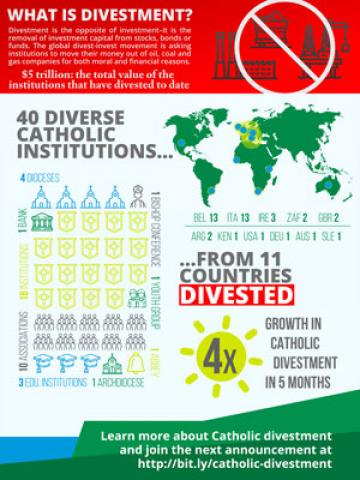
Catholic institutions are divesting from fossil fuel companies and investing in renewable energy as part of their response to the urgent call Pope Francis sounded in Laudato Si’ and in response to the statement by Catholic Bishops from all continents at the Paris climate talks in 2015. The following article was published in the March-April 2018 issue of NewsNotes .
“Put an end to the fossil fuel era…and provide affordable, reliable and safe renewable access for all.” – Catholic Bishops from all continents in a statement to the UN Climate Change Conference in Paris, 2016.
Last October, a group of 40 Catholic institutions committed to caring for our common home by announcing their divestment from fossil fuels. This is the largest joint Catholic announcement to date. Among the religious communities in the group are the School Sisters of Notre Dame, the Society of the Sacred Heart, and the Australian Jesuit Province. (See the complete list at http://bit.ly/2sXaiZn )
Since the release of Laudato Si’ in 2015 various religious communities have committed to divestment: Missionary Society of St. Columban, Scarboro Missions, Franciscan Sisters of Mary, and Sisters of Loretto were some of the first. Institutions such as Georgetown University, University of Dayton, and Trocaire have also committed to divestment.
Amy Echeverria, the Director Justice, Peace and Integrity of Creation for the Columbans explained why the international mission society made the commitment to divest from fossil fuels on the Feast of St. Francis, October 4, 2016:
“Columbans have a long history of commitment to care for creation which is reflected in our education, advocacy, networking and pastoral care…With the growing divestment from fossil fuels, particularly within the Catholic world, and in light of Laudato Si’ , we see this as a concrete way to further align our mission with our [investment] policies and practices.”
Image: "What is divestment" infographic by Global Catholic Climate Movement.
Divestment is the removal of investment capital from stocks, bonds, or funds. The global divest-invest movement asks institutions to move their money out of oil, coal, and gas companies for both moral and financial reasons, and encourages reinvestment of those resources in clean energy companies that will help solve the climate crisis while tackling energy poverty.
In June of 2016, when four Catholic organizations announced that they were selling their investments in coal, oil and gas companies as the moral case against fossil fuels continued to build, Tomás Insua, Coordinator of the Global Catholic Climate Movement, commented: “These congregations mark the beginning of a new momentum for the Catholic Church. Pope Francis’ encyclical highlights that politics and business have been slow to react in a way commensurate with the urgency of the challenges facing our world. Through divestment from fossil fuels and reinvestment in clean energy, Catholic institutions are starting to use their financial resources to live Laudato Si’ .”
The four that committed to divestment in 2016 are the Marist Sisters Australia, Presentation Congregation Queensland, Presentation Sisters Wagga Wagga, and the Passionists – Holy Spirit Province Australia, New Zealand, Papua New Guinea, and Vietnam.
Not long after the announcement in 2016, Cardinal Peter Turkson described what he sees as the next steps the Church should take in responding to the global crisis of climate change:
“A genuine examination of conscience would recognize not only our individual failings but also our institutional failings. As Pope Francis says, ‘we are participants in a system that ‘has imposed the mentality of profit at any price, with no concern for social exclusion or the destruction of nature.’ This implicates all of us in one way or another.
“Ecological conversion entails not only individual conversion,” Cardinal Turkson continued, “but community conversion, too. We need a conversion of economics and politics – away from an obsession with short-term and self-centered financial or electoral gains, and toward a true appreciation of the common good.”
Recently, Trócaire, the overseas development agency of the Irish Catholic Church, published a guide for Catholic communities and institutions who are considering divestment from fossil fuels entitled Ethical Investments in an era of Climate Change (available online at http://bit.ly/2EYjRZB ). Trócaire concludes:
“If a significant portion of Catholic institutions review their investment policies and publicize their decision to divest from the most harmful sectors, Catholic institutions can make a significant impact in caring for the planet. There is possibly no other global institution as well placed to show prophetic and practical leadership at this critical moment.”
Faith in action: Learn more from the Global Catholic Climate Movement at http://bit.ly/2ClvUCD
National Catholic Safeguarding Standards Presentation Sisters Queensland Congregation
Audit Report August 2020
Catholic Professional Standards Ltd acknowledges the lifelong trauma of abuse victims, survivors and their families, the failure of the Catholic Church to protect, believe and respond justly to children and vulnerable adults, and the consequent breaches of community trust.
Catholic Professional Standards Ltd is committed to fostering a culture of safety and care for children and vulnerable adults.
This report is available on the Church Reports page of the CPSL website
Catholic Professional Standards Ltd Level 13, 200 Queen Street Melbourne Victoria 3000
Phone: 1300 603 411 Email: [email protected] www.cpsltd.org.au Table of Contents
1. Executive Summary 1 1.1 Context 1 1.2 Background 1 1.3 Audit Approach 2 1.4 Overall Audit Findings 2
2. Assessment of Compliance with NCSS Indicators 5
3. Detailed Findings and Recommendations 16
Appendix A: Compliance Assessment Scale 18
Appendix B: Audit Finding Priorities 19
Appendix C: Glossary 20
1. Executive Summary
1.1 Context Catholic Professional Standards Limited (CPSL) was established by the Australian Catholic Bishops Conference (ACBC) and Catholic Religious Australia (CRA) in response to the findings of the Royal Commission into Institutional Responses to Child Sexual Abuse (Royal Commission), presented on 15 December 2017 to the Governor General of Australia. As part of its constitutional mandate, CPSL has developed the National Catholic Safeguarding Standards (NCSS) to provide the framework for Catholic Church entities to build safe cultures and environments and to ensure that safeguarding practices are consistently applied across the Catholic Church in Australia. The first edition of the NCSS was formally released on 30 May 2019 and applies to all Catholic ministries, including Catholic dioceses, religious institutes, institutions providing education, health and aged care, social and community services, pastoral care and other services. CPSL has also established a risk-based audit program to assess compliance with the NCSS. This audit report includes the results of the NCSS compliance assessment for the Presentation Congregation Queensland (PCQ).
1.2 Background The Presentation Congregation was founded by Honora (Nano) Nagle and four companions in Cork , on Christmas Eve 1775. The Congregation’s name refers to the Feast of the Presentation of Mary in the Temple. In 1805, Pope Pius VII declared the Presentation Congregation an Institute of Pontifical Rite. The Presentation Congregation Queensland was founded in response to a request by the Bishop of Rockhampton to the Presentation Sisters in Wagga Wagga , New South Wales, for Sisters to teach children and provide educational services to the remote areas of the Diocese. The five Sisters who volunteered arrived in Longreach, Queensland on February 13, 1900. This foundation was autonomous and is now known as the Presentation Congregation Queensland (PCQ), with administration offices based in Brisbane. The Congregation no longer has governance of any formal ministries. Of the 49 Sisters, a number are fully retired or in aged care, whilst those who are still active perform administrative and/or pastoral functions within parishes, schools and aged care facilities. PCQ has been assessed as a “Category Two” Church entity for application of the NCSS (Working with Children). There are 7 NCSS Standards, 33 NCSS Criteria and 84 NCSS Indicators that apply to Category Two entities. For further details of the category system and the Indicators which are applicable, refer to the NCSS documentation available on the Audit Framework page of the CPSL website. Our assessment of PCQ’s compliance with the relevant Indicators is detailed in Section 2 of this report. Our recommendations for improvement, including PCQ’s management responses, are included in Section 3 of this report. The full audit report is also publicly available on the Church Reports page of the CPSL website.
NCSS Audit Report August 2020 – Presentation Sisters Queensland Congregation 1 1.3 Audit Approach The NCSS seek to build a culture of shared responsibility for safeguarding and to ensure that policies, practices and codes of behaviour work in unison to prevent, detect and respond appropriately to potential or actual incidents of child abuse. In this context, the audit processes we have undertaken are intended to provide reasonable assurance that safeguarding controls have been designed appropriately and are operating effectively. Accordingly, this report provides a point-in-time assessment of the safeguarding practices implemented by PCQ and the extent of its compliance with the requirements of the NCSS. Our testing procedures included the following: • interviews, observations and enquiry with the PCQ Leadership Team and Safeguarding Officer; • interviews with eight (25%) PCQ members who are still in formal or volunteer ministry, in relation to how safeguarding activities are applied in their daily work; • review of key safeguarding documents, policies and procedures; and • assessment of the design, and testing of the operation of safeguarding controls implemented by PCQ.
1.4 Overall Audit Findings Compliance with the NCSS Indicators has been assessed using a four-point maturity scale.1 Our assessment indicates that PCQ has fully implemented or has substantially progressed in the implementation of all 68 (100%) of the 682 Indicators which are relevant to their operations. The key findings from the audit are summarised below.
NCSS Standard 1 – Committed leadership, governance and culture PCQ is committed to the safeguarding of children and vulnerable adults and has appointed a dedicated Safeguarding Co-Ordinator, who is working with the leadership team to monitor and oversee the implementation of the NCSS in all areas of the Congregation’s operations. PCQ has a comprehensive suite of safeguarding policies including a Safeguarding Children, Young People and Vulnerable Adults Prevention and Protection Policy (Safeguarding Policy), Code of Conduct and Complaints Policy. At the time of the audit, these documents were on display at the PCQ office and available by request. Whilst PCQ does not have its own website, information regarding PCQ is available on the Queensland section of the “Presentation Society” website, which is the combined website for the federation of the six Presentation Congregations in Australia and Papua New Guinea. PCQ’s safeguarding documents are now publicly available on the Queensland section of this website. PCQ has a comprehensive risk management framework, with detailed risk assessments having been completed for the Sisters’ key activities and ministries, as well as for PCQ’s premises.
NCSS Standard 5 – Robust human resource management PCQ’s recruitment documentation includes appropriate safeguarding elements and employee contracts have recently been updated to include safeguarding requirements. Sisters who are engaged in formal ministry, as well as those identified as capable of ministering in a volunteer capacity, have the appropriate working with children checks. PCQ has a policy in place for professional/pastoral supervision, and these requirements are in place and operating for relevant personnel.
1 Refer Appendix A for definitions of the maturity scale used for the Compliance Assessment. 2 Of the 84 NCSS Indicators applicable to Category Two, 16 of these are not relevant to PCQ’s operations.
NCSS Audit Report August 2020 – Presentation Sisters Queensland Congregation 2 PCQ does not have any candidates in formation and does not intend to accept any new candidates in the future. Accordingly, we have not assessed any formation program activities or curriculum as part of this audit.
NCSS Standard 6 – Effective complaints management The CPSL audit does not re-assess the outcomes of individual complaints. The audit focuses on reviewing current complaint management practices, including policies and procedures in place to prevent, detect, report and respond to all incidents and complaints, and the associated training, awareness and education available for all personnel. Audit procedures indicate that PCQ’s complaints handling procedures are operating effectively and there have been very few complaints in the Congregation’s history.
NCSS Standard 7 – Ongoing education and training PCQ has provided safeguarding training to all Sisters and employees and has a formal program of training planned for the remainder of 2020 and into 2021. Records of attendance at training are maintained and are comprehensive.
NCSS Standard 8 – Safe physical and online environments PCQ has an Information Technology Policy which contains guidance on the use of technology and the internet, which has been rolled out to all Sisters and staff. This includes a formal internet monitoring program using web protection and content filtering, which has been installed on all congregational devices. Third parties and contractors who conduct work on PCQ premises are required to sign off as acknowledgment of PCQ’s safeguarding policies, and PCQ maintains comprehensive records in this regard.
NCSS Standard 9 – Continuous improvement NCSS Standard 10 – Policies and procedures support child safety PCQ has recently developed a Safeguarding Implementation Plan which includes key safeguarding initiatives, goals and strategies. A process is being developed to ensure that the plan is monitored and progress tracked on a regular basis.
The following table shows the overall compliance assessment for each of the Standards.
NCSS Audit Report August 2020 – Presentation Sisters Queensland Congregation 3 Assessment of Compliance
(M) (D) (N)
Indicators (NR)
National Catholic Safeguarding Standard Not PCQ Initial / Ad hoc Ad Defined & (Category One) Managed & & Managed # NCSS NCSS #
Not Relevant toNot addressed developed measurable
1: Committed leadership, governance & culture 14 2 12 - - -
5: Robust human resource management 21 10 11 - - -
6: Effective complaints management 24 - 24 - - -
7: Ongoing training & education 7 - 7 - - -
8: Safe physical and online environments 6 2 4 - - -
9: Continuous improvement 6 2 3 1 - -
10: Policies and procedures support child safety 6 - 6 - - -
TOTAL 84 16 67 1 - - 68 (100%) 0 (0%)
Audit recommendations are classified according to priority and urgency for remediation.3 There are no Priority 1 (high rated) audit recommendations for PCQ. There are two Priority 2 (medium rated) recommendations, which are detailed in Section 3 of this report. Each recommendation also contains PCQ’s response to the audit finding, including management actions.
We would like to thank the PCQ leadership team and all personnel who were involved in the audit for their cooperation and assistance.
3 Refer Appendix B for definitions of the Priority ratings used for audit recommendations.
NCSS Audit Report August 2020 – Presentation Sisters Queensland Congregation 4 2. Assessment of Compliance with NCSS Indicators
Standard 1 Committed leadership, governance and culture
Child safeguarding is embedded in the entity’s leadership, governance and culture
Criterion 1.1 - The entity publicly commits to child safeguarding Managed & Defined & Initial/ Ad- Not and takes a zero-tolerance approach to child abuse. Measurable Developed Hoc Addressed The entity has a Child Safeguarding Policy that is approved and 1.1.1 endorsed by the Church Authority and/or relevant leadership ✓ body and is publicly available. The entity publishes a Child Safeguarding Commitment 1.1.2 Statement which is openly displayed and publicly available. ✓ Observations: Requirements of the Indicator are in place. No recommendations for improvement noted.
Criterion 1.2 - A child safeguarding culture is championed and Managed & Defined & Initial/ Ad- Not modelled at all levels of the entity from the top down and Measurable Developed Hoc Addressed bottom up. The Church Authority and leaders of the entity create and maintain an entity’s culture of safeguarding by: • promoting child safeguarding regularly; 1.2.1 • emphasising that child-safeguarding is everyone’s ✓ responsibility; and • actively monitoring safeguarding compliance and risk management. Personnel understand that child safeguarding is everyone’s responsibility and are empowered to provide input on child 1.2.4 ✓ safeguarding practices. Observations: Requirements of the Indicators are in place. No recommendations for improvement noted.
Criterion 1.3 - Governance arrangements facilitate Managed & Defined & Initial/ Ad- Not implementation of a Child Safeguarding Policy across the Measurable Developed Hoc Addressed entity’s activities. Governance arrangements are transparent and include
1.3.1 safeguarding roles and responsibilities to ensure accountability ✓ for safeguarding is clear. Where the Church Authority’s governance includes countries 1.3.2 other than Australia, the entity must apply these Standards Not relevant to current operations taking into account relevant international declarations and local legislation. Observations: Requirements of the Indicators are in place. No recommendations for improvement noted.
NCSS Audit Report August 2020 – Presentation Sisters Queensland Congregation 5 Criterion 1.4 - A Code of Conduct provides guidelines for Managed & Defined & Initial/ Ad- Not personnel on expected behavioural standards and Measurable Developed Hoc Addressed responsibilities. The Code of Conduct explicitly and equally applies to all 1.4.1 personnel and provides guidance on appropriate and expected ✓ standards of behaviour of personnel towards children. The Code of Conduct is written in accessible language and 1.4.2 communicated to personnel, children, families and carers. ✓ The Code of Conduct takes into account the needs of all children, paying particular attention to Aboriginal and Torres Strait Islander children, children with disability, children from 1.4.3 culturally and linguistically diverse backgrounds and children ✓ with particular vulnerabilities, for example, children who can’t live at home. Observations: Requirements of the Indicator are in place. No recommendations for improvement noted.
Criterion 1.5 - The entity has risk management strategies Managed & Defined & Initial/ Ad- Not focusing on preventing, identifying and mitigating risks to Measurable Developed Hoc Addressed children. The entity has a clearly documented child safeguarding risk management plan, as part of its overall risk management 1.5.1 strategy, which considers actual and potential risks relating to ✓ children. The entity has appropriate risk management processes in place to assess, evaluate, review and oversee the safeguarding of 1.5.2 children participating in, or receiving, ministries offshore Not relevant to current operations including cultural immersions, pilgrimages, solidarity campaigns and world youth days. Leaders of the entity manage safeguarding risks effectively, 1.5.3 through regular identification, monitoring, reporting and review ✓ of risks. Observations: Requirements of the Indicator are in place. No recommendations for improvement noted.
Criterion 1.6 - Personnel understand their obligations on Managed & Defined & Initial/ Ad- Not information sharing and record keeping. Measurable Developed Hoc Addressed The entity has documented information sharing and record 1.6.1 keeping policies and procedures which are communicated to ✓ personnel. The entity’s information sharing and record keeping policies and procedures relating to all aspects of child safeguarding, 1.6.2 including incidents and complaints, apply sound record keeping ✓ principles. Observations: Requirements of the Indicator are in place. No recommendations for improvement noted.
NCSS Audit Report August 2020 – Presentation Sisters Queensland Congregation 6 Standard 5 Robust human resource management
People working with children are suitable and supported to reflect child safeguarding values in practice
Criterion 5.1 - Recruitment, including advertising, interview Managed & Defined & Initial/ Not questions, referee checks and personnel pre-employment Measurable Developed Ad-Hoc Addressed screening, emphasises child safeguarding. The entity emphasises its commitment to child safeguarding and zero-tolerance approach to child abuse in all aspects of its 5.1.1 ✓ advertising, screening and recruitment for personnel. The entity documents its safeguarding approach in recruitment 5.1.2 and screening procedures and processes. ✓ Positions are assessed for the expected level of contact with children and appropriate child safeguarding recruitment 5.1.3 ✓ procedures are implemented. 5.1.4 Position descriptions, selection criteria, referee checks and interview questions articulate: • that children are valued and respected; • the commitment of the entity to child safeguarding; and ✓ • where appropriate to the role, an understanding of children’s developmental needs and culturally safe practices. Observations: Requirements of the Indicator are in place. No recommendations for improvement noted.
Criterion 5.2 - Relevant personnel (including all seminarians, Managed & Defined & Initial/ Not clergy and religious) have current working with children checks or Measurable Developed Ad-Hoc Addressed equivalent background checks. The entity has a policy which is implemented that ensures: • personnel have a current working with children check as required by legislation, prior to working with children; and 5.2.1 • where a working with children check is not required by ✓ legislation, other background checks for personnel are conducted prior to working with children. The entity keeps records and monitors the status of working 5.2.2 with children checks and/or background checks for all ✓ personnel. Observations: 5.2.2 Requirements of the Indicator are in place, however the process and timeframe for conducting National Criminal History (police) checks for relevant personnel should be formally documented. Refer recommendation #1.
Criterion 5.3 - Personnel receive an appropriate induction and are Managed & Defined & Initial/ Not aware of child safeguarding responsibilities, including reporting Measurable Developed Ad-Hoc Addressed obligations. All personnel participate in a safeguarding induction program, 5.3.1 which occurs as soon as possible after commencement. ✓ All Church Authorities who are a signatory to a Service Agreement with CPSL are required to participate in the NCSS 5.3.2 Introductory Session for Leaders within four months of ✓ commencement. Observations: Requirements of the Indicator are in place. No recommendations for improvement noted.
NCSS Audit Report August 2020 – Presentation Sisters Queensland Congregation 7 Criterion 5.5 - Robust processes exist for screening candidates Managed & Defined & Initial/ Not before and during seminary and religious formation, as well as for Measurable Developed Ad-Hoc Addressed ongoing formation, support and supervision of clergy and religious. The Church Authority draws upon broad-ranging professional advice in its decision-making relating to candidates for seminary/formation 5.5.1 programs and ordination/profession of vows. This includes a Not relevant to current operations positive duty to disclose to other Church Authorities where an applicant or candidate for seminary/formation programs does not continue through to ordination/profession of vows. Seminary and initial formation programs have robust screening 5.5.2 processes for candidates for religious ministry, including external Not relevant to current operations psychological and psychosexual assessments. The entity promotes as normative the participation of all bishops, 5.5.3 leaders of religious institutes, clergy and religious in active ministry, ✓ in no less than six hours professional/pastoral supervision per year. The entity promotes as normative, all clergy and religious in active ministry, for the sake of proper accountability, are offered and 5.5.4 access both ongoing professional development and annual ✓ performance appraisals. All newly ordained clergy and newly professed religious are 5.5.5 supported with a suitable mentor for at least five years post Not relevant to current operations ordination or final profession. Observations: Requirements of the Indicator are in place. No recommendations for improvement noted.
Criterion 5.6 - Seminary and formation programs for clergy and religious Managed & Defined & Initial/ Not have appropriate curriculum to build the knowledge and skills of Measurable Developed Ad-Hoc Addressed candidates to understand and lead child safeguarding initiatives. Seminary and initial formation programs have appropriate curriculum throughout the formation program which builds 5.6.1 Not relevant to current operations candidates’ knowledge and skills in a range of areas to support child safeguarding. Seminary and initial formation programs ensure promotion of 5.6.2 Not relevant to current operations pastoral responses to victims/survivors of sexual abuse. Seminary and initial formation programs are delivered in such a way 5.6.3 as to protect against the development and/or reinforcement of Not relevant to current operations clericalist attitudes and behaviours. Observations: N/A - there are no sisters in formation.
Criterion 5.7 - Credentialing and movement of seminarians, clergy Managed & Defined & Initial/ Not and religious is appropriately managed. Measurable Developed Ad-Hoc Addressed The entity implements a system to assess the credentials and manage 5.7.1 movement of all seminarians, clergy and religious moving between ✓ different seminaries and Church jurisdictions. Observations: Requirements of the Indicator are in place. No recommendations for improvement noted.
NCSS Audit Report August 2020 – Presentation Sisters Queensland Congregation 8 Criterion 5.8 - Entities which receive overseas clergy and religious for Managed & Defined & Initial/ Not work in ministry have targeted programs for the screening, induction, Measurable Developed Ad-Hoc Addressed professional supervision and development of these individuals. Selection and screening procedures for overseas clergy and religious are targeted, thorough and follow, as far as practicable, the same 5.8.1 processes as for Australian personnel. This includes the Australian Not relevant to current operations Church Authority obtaining screening information from the International Church Authority. All overseas clergy and religious participate in a Safeguarding 5.8.2 Induction program, documented by the entity, before work with Not relevant to current operations children begins. Overseas clergy and religious are supported with a suitable mentor 5.8.3 Not relevant to current operations for at least the first two years of their time in Australia. The entity promotes as normative the participation of all overseas 5.8.4 clergy and religious in active ministry in no less than six hours of Not relevant to current operations professional/pastoral supervision per year. Observations: There are no Sisters from overseas who are assigned to the Australian Unit.
Standard 6 Effective complaints management Processes for raising concerns and complaints are responsive, understood, accessible and used by children, families, carers, communities and personnel Criterion 6.1 - The entity has an effective Complaints Handling Policy and procedures which clearly outline the roles and responsibilities, Managed & Defined & Initial/ Not approaches to dealing with different types of complaints, reporting Measurable Developed Ad-Hoc Addressed obligations and record keeping requirements. The entity’s policies, procedures and practices ensure that all 6.1.1 mandatory reporting obligations are met. ✓ There are documented procedures that provide step-by-step guidance on what action to take for different types of complaints, 6.1.2 including breaches of Codes of Conduct, disclosures, allegations or ✓ concerns of abuse of a child, be they historic or current. There are clear procedures for identifying and mitigating actual and 6.1.3 perceived conflicts of interest in complaint management. ✓ The entity works in cooperation with relevant organisations and seeks 6.1.4 specialist advice from statutory child protection services when ✓ necessary. Key roles and responsibilities in relation to handling complaints are 6.1.5 articulated within the Complaint Handling Policy and procedures. ✓ The Complaint Handling Policy and procedures differentiate, where appropriate, between a child victim and an adult bringing forward a 6.1.6 ✓ complaint of abuse suffered as a child. A process is in place to record all child abuse complaints, incidents, allegations, disclosures, concerns and referrals. The system must be 6.1.7 secure so that confidential information is stored, protected and ✓ retained for 50 years. Observations: Requirements of the Indicator are in place. No recommendations for improvement noted.
NCSS Audit Report August 2020 – Presentation Sisters Queensland Congregation 9 Criterion 6.2 - The entity has a child-focused complaints handling Managed & Defined & Initial/ Not system that is understood by children, families, carers and personnel. Measurable Developed Ad-Hoc Addressed The complaints handling system prioritises the safety and well-being 6.2.1 of children. ✓ 6.2.2 The Complaints Handling Policy and procedures are publicly available in a variety of formats, including age and developmentally appropriate ✓ for children, enabling complaints processes to be easily understood. Observations: Requirements of the Indicator are in place. No recommendations for improvement noted.
Criterion 6.3 - Complaints are taken seriously, and responded to Managed & Defined & Initial/ Not promptly and thoroughly. Measurable Developed Ad-Hoc Addressed The Complaints Handling Policy requires that, upon receiving a complaint of child abuse, an initial risk assessment is conducted to 6.3.1 identify and minimise any risk to children. Ongoing risk assessments ✓ are required throughout all investigation processes. The Complaints Handling Policy requires that at the completion of the initial risk assessment, where a complaint of child sexual abuse is 6.3.2 plausible, and there is a risk that the person may come into contact ✓ with children, the person be stood down from their role and/or ministry while the complaint is investigated. The Complaints Handling Policy is aligned, and operates in conjunction, with the entity’s documented disciplinary and grievance policies and processes, in such a way that at the completion of the 6.3.3 initial risk assessment, a breach or breaches of the Code of Conduct ✓ in relation to inappropriate behaviour towards a child are effectively investigated and managed, and include provisions for personnel to be redeployed, stood down and/or dismissed. Complainants are responded to promptly and kept informed as to the 6.3.4 progress of dealing with their complaint. ✓ Support and care are provided to a child who has experienced or is 6.3.5 alleging abuse, and other affected parties. ✓ Appropriate confidentiality is maintained with due regard for the 6.3.6 Australian Privacy Principles and relevant legislation in relation to ✓ information sharing in the context of child safeguarding. Documented policies and processes empower and support personnel 6.3.7 to raise, in good faith, concerns and allegations about unacceptable ✓ behaviour towards children by other personnel. Where a complaint related to child sexual abuse against a seminarian, clergy or religious is substantiated on the balance of probabilities, 6.3.8 with due respect to the rights of individuals, the Church Authority ✓ should remove that individual from ministry. Where a seminarian, clergy or religious is convicted of an offence relating to child sexual abuse, that individual should be permanently removed from ministry. The Church Authority must take practicable 6.3.9 steps to prohibit that individual from holding themselves out as being ✓ a person with religious authority and should present a case to the relevant dicastery for dismissal from the clerical state and/or dispensation from vows. Observations: Requirements of the Indicator are in place. No recommendations for improvement noted.
NCSS Audit Report August 2020 – Presentation Sisters Queensland Congregation 10 Criterion 6.4 - The entity has policies and procedures in place that address reporting of complaints and concerns to relevant authorities, Managed & Defined & Initial/ Not whether or not the law requires reporting, and co-operates with law Measurable Developed Ad-Hoc Addressed enforcement. The Complaints Handling Policy requires that: • concerns and complaints of child abuse occurring within the entity be reported to the appropriate statutory authority/ies, regardless 6.4.1 of whether the reporting is mandated; and ✓ • personnel cooperate with law enforcement procedures and directives. Observations: Requirements of the Indicator are in place. No recommendations for improvement noted.
Criterion 6.5 - Reporting, privacy and employment law obligations Managed & Defined & Initial/ Not are met. Measurable Developed Ad-Hoc Addressed The Complaints Handling Policy requires that all relevant reporting, 6.5.1 privacy and employment law obligations are met. ✓ Observations: Requirements of the Indicators are in place. No recommendations for improvement noted.
Criterion 6.6 - The Church Authority ensures mechanisms are in place Managed & Defined & Initial/ Not to care for adult complainants. Measurable Developed Ad-Hoc Addressed The entity offers appropriate pastoral care to adult complainants, 6.6.1 which recognises their unique needs. This should include an offer ✓ from the Church Authority to meet the complainant in person. The Church Authority facilitates adult complainants’ access to appropriately trained personnel whose clearly defined roles are to 6.6.2 listen to and represent the pastoral needs of the complainant. This is ✓ done in consultation with the complainant. Observations: Requirements of the Indicators are in place. No recommendations for improvement noted.
Criterion 6.7 - The Church Authority ensures mechanisms are in place Managed & Defined & Initial/ Not to monitor and support respondents facing allegations. Measurable Developed Ad-Hoc Addressed The Church Authority has access to appropriately trained personnel - lay, religious or clergy - whose clearly defined roles are to listen to 6.7.1 and represent the pastoral needs of the respondent. This is done in ✓ consultation with the respondent. The Church Authority has suitable arrangements in place for the monitoring and support of a respondent, where there is a plausible 6.7.2 complaint, until (and if) the Church Authority no longer has ✓ responsibility for monitoring the respondent. Observations: Requirements of the Indicators are in place. No recommendations for improvement noted.
NCSS Audit Report August 2020 – Presentation Sisters Queensland Congregation 11 Standard 7 Ongoing education and training
Personnel are equipped with knowledge, skills and awareness to keep children safe through information, ongoing education and training
Criterion 7.1 - Personnel are trained and supported to effectively Managed & Defined & Initial/ Not implement the entity’s child safeguarding policies and procedures. Measurable Developed Ad-Hoc Addressed The entity provides regular opportunities to educate/train personnel on its Child Safeguarding Policy and procedures including through 7.1.1 induction and refresher safeguarding training (at least every three ✓ years). The entity’s induction and refresher safeguarding training must as a minimum cover: • Code of Conduct; • safeguarding risk management; 7.1.2 • Child Safeguarding Policy and procedures; ✓ • Complaints Handling Policy and procedures; • reporting obligations; and • e-safety training. The entity keeps records of participation to ensure all personnel 7.1.3 attend induction and refresher safeguarding training. ✓ The entity ensures that personnel who have specific child safeguarding responsibilities, such as those appointed to the role of 7.1.4 safeguarding co-ordinator and those appointed to the Safeguarding ✓ Committee, receive ongoing support and professional development relevant to their role. Observations: Requirements of the Indicators are in place. No recommendations for improvement noted.
Criterion 7.3 - Personnel receive training to enable them to respond Managed & Defined & Initial/ Not effectively to child safeguarding risks, concerns, disclosures and Measurable Developed Ad-Hoc Addressed allegations of child abuse. The entity provides training to equip relevant personnel to 7.3.1 appropriately respond to and support those bringing forward ✓ concerns, disclosures and allegations of child abuse. The entity provides training to ensure personnel are aware of 7.3.2 information sharing and record keeping policies and procedures. ✓ The entity provides training to ensure personnel are aware of their reporting obligations under state/territory legislative requirements including: 7.3.3 • reporting criminal behaviour to police; ✓ • mandatory reporting to child protection authorities; • Reportable Conduct Scheme; and • reporting to regulatory authorities/government departments. Observations: Requirements of the Indicators are in place. No recommendations for improvement noted.
NCSS Audit Report August 2020 – Presentation Sisters Queensland Congregation 12 Standard 8 Safe physical and online environments
Physical and online environments promote safety and contain appropriate safeguards to minimise the opportunity for children to be harmed
Criterion 8.2 - The online environment is used in accordance with the Managed & Defined & Initial/ Not entity’s Code of Conduct, safeguarding policies and procedures. Measurable Developed Ad-Hoc Addressed Personnel access and use online environments in line with the entity’s 8.2.1 code of conduct and relevant communication protocols. ✓ The entity routinely monitors the online environment, reporting and responding to breaches of its Code of Conduct or child safeguarding 8.2.2 policies in accordance with the entity’s disciplinary, complaint ✓ handling or other relevant processes. Observations: Requirements of the Indicators are in place. No recommendations for improvement noted.
Criterion 8.3 - Risk management plans consider risks posed by the Managed & Defined & Initial/ Not entity’s settings, activities and physical environments. Measurable Developed Ad-Hoc Addressed The entity assesses safeguarding risks in the physical environments under its control or management including buildings, structures, open 8.3.1 spaces, grounds, homes of religious and clergy, and arrangements for ✓ live-in carers/caretakers. Where an entity becomes aware that a person (other than personnel of that entity) attending any of its services or activities is the subject of a substantiated complaint of child sexual abuse or has been 8.3.2 convicted of an offence relating to child sexual abuse, the entity has Not relevant to current operations in place and implements a process for assessing and managing the risks posed to children by that person’s ongoing involvement in the service or activity. Observations: Requirements of the Indicators are in place. No recommendations for improvement noted.
Criterion 8.4 - Entities that contract facilities and services to and from Managed & Defined & Initial/ Not third parties have procurement policies that ensure safeguarding of Measurable Developed Ad-Hoc Addressed children. The entity considers the risks posed to children arising from any third parties engaged by the entity and conducts sufficient due diligence to 8.4.1 ensure that the third party has appropriate child safeguarding ✓ practices and policies in place. The entity has conducted sufficient due diligence on all third parties 8.4.2 who use the entity’s facilities to ensure child safeguarding practices Not relevant to current operations and policies are in place. Observations: Requirements of the Indicators are in place. No recommendations for improvement noted.
NCSS Audit Report August 2020 – Presentation Sisters Queensland Congregation 13 Standard 9 Continuous improvement
Entities regularly review and improve implementation of their systems for keeping children safe
Criterion 9.1 - The entity regularly reviews and improves child Managed & Defined & Initial/ Not safeguarding practices. Measurable Developed Ad-Hoc Addressed The entity has a clearly documented Safeguarding Implementation Plan which outlines the monitoring and continual improvement of 9.1.1 child safeguarding practices. ✓ The Child Safeguarding Implementation Plan is regularly reviewed, progress is tracked and actions/strategies updated. The entity’s Child Safeguarding Policy is subject to regular review – at 9.1.4 least every three years. ✓ Observations: 9.1.1 PCQ has recently developed a Safeguarding Implementation Plan and will be implementing a process to monitor and track progress against the plan going forward. Refer recommendation #2.
Criterion 9.2 - The entity analyses concerns and complaints to identify Managed & Defined & Initial/ Not causes and systemic failures to inform continuous improvement. Measurable Developed Ad-Hoc Addressed Processes are in place to analyse individual incidents or complaints 9.2.1 relating to child safeguarding practices and/or failures. ✓ Processes are in place to identify systemic issues or patterns and drive 9.2.2 continuous improvement. ✓ Observations: Requirements of the Indicators are in place. No recommendations for improvement noted.
Criterion 9.3 - The Church Authority reports on the findings of Managed & Defined & Initial/ Not relevant reviews to personnel, children, families, carers and Measurable Developed Ad-Hoc Addressed community. The Church Authority promotes to all its stakeholders any audit 9.3.1 reports relating to the Church Authority, and related entities, Not applicable – this is the first audit by CPSL published by Catholic Professional Standards Ltd. The Church Authority reports on findings of relevant reviews of Not applicable – no such reviews have been 9.3.2 safeguarding policies, procedures and practices to its stakeholders. conducted to date Observations: N/A
NCSS Audit Report August 2020 – Presentation Sisters Queensland Congregation 14 Standard 10 Policies and procedures support child safety
Policies and procedures document how the entity is safe for children
Criterion 10.1 - Policies and procedures address National Catholic Managed & Defined & Initial/ Not Safeguarding Standards. Measurable Developed Ad-Hoc Addressed All relevant policies and procedures reference appropriate 10.1.1 safeguarding approaches, requirements and responsibilities. ✓ Observations: Requirements of the Indicators are in place. No recommendations for improvement noted.
Criterion 10.2 - Policies and procedures are accessible and easy to Managed & Defined & Initial/ Not understand. Measurable Developed Ad-Hoc Addressed The entity’s policies and procedures relevant to safeguarding are 10.2.1 readily available and accessible to all personnel. ✓ Observations: Requirements of the Indicator are in place. No recommendations for improvement noted.
Criterion 10.3 - Best practice policy models and stakeholder Managed & Defined & Initial/ Not consultation inform the development and review of policies and Measurable Developed Ad-Hoc Addressed procedures. The entity has processes in place to monitor adherence to policies 10.3.1 and procedures relevant to safeguarding. ✓ The entity has processes in place to develop and review its policies and procedures relevant to safeguarding. 10.3.2 These processes include consulting with and incorporating advice ✓ from experts, children, families, carers and communities. Observations: Requirements of the Indicators are in place. No recommendations for improvement noted.
Criterion 10.4 - The Church Authority and leaders model compliance Managed & Defined & Initial/ Not with policies and procedures. Measurable Developed Ad-Hoc Addressed The Church Authority and leaders promote and enact all policies and 10.4.1 procedures relevant to safeguarding. ✓ Observations: Requirements of the Indicators are in place. No recommendations for improvement noted.
Criterion 10.5 - Personnel understand and implement the policies and Managed & Defined & Initial/ Not procedures. Measurable Developed Ad-Hoc Addressed The entity encourages regular discussion and feedback from 10.5.1 personnel on their understanding and practical implementation of ✓ policies and procedures. Observations: Requirements of the Indicators are in place. No recommendations for improvement noted.
NCSS Audit Report August 2020 – Presentation Sisters Queensland Congregation 15 3. Detailed Findings
Standard 5: Robust human resource management People working with children are suitable and supported to reflect child safeguarding values in practice
Recommendation #1 Priority 2 Criterion 5.2 - Relevant personnel (including all seminarians, clergy and religious) have current working with children checks or equivalent background checks We note that leadership team members have a National Criminal History (police) check Details of finding however there is no formal policy regarding the frequency for conducting such checks. We recommend the following: 1. Sisters in leadership positions, including those with access to keys, monetary funds or other assets and those who represent the entity in a formal capacity, should undergo a National Criminal History (police) check. 2. National Criminal History (police) checks should be undertaken regularly, at least every Recommendation three years. 3. Whilst we acknowledge that records of Blue Cards and police checks are kept, we recommend that a formal process be put in place to ensure that all such records, including those for any personnel who have left the organisation, be kept for a minimum of 50 years, as per Indicator 1.6.2.
1. We have assessed the requirement for National Criminal History (police) checks and have identified that these are required for the Congregation Leader and members of the leadership team, all of whom have the required police checks. 2. We confirm that police checks will be conducted every three years and will incorporate Agreed Action this requirement into our business processes. 3. All documentation in regard to Blue Cards and police checks are kept for a minimum of 50 years, both in hard copy form in steel cabinets and in soft copy form. This requirement is already noted in our record keeping policy and will be incorporated into our business processes.
Responsibility Business Officer
Due date Completed
NCSS Audit Report August 2020 – Presentation Sisters Queensland Congregation 16 Standard 9: Continuous improvement
Recommendation #2 Priority 2 Criterion 9.1 - The entity regularly reviews and improves child safeguarding practices
PCQ has recently developed a Safeguarding Implementation Plan which will be used for Details of finding monitoring and tracking of safeguarding strategies and initiatives. We recommend the Safeguarding Implementation Plan be used as a living document to track Recommendation ongoing safeguarding improvement initiatives, with target dates identified, tracked and monitored.
The Safeguarding Implementation Plan has been developed, with goals and initiatives documented for ongoing monitoring and tracking. Agreed Action A process will be established whereby the plan will be reviewed and monitored on a regular basis.
Due date 30 September 2020
NCSS Audit Report August 2020 – Presentation Sisters Queensland Congregation 17 Appendix A
COMPLIANCE ASSESSMENT SCALE
The compliance assessment of the entity’s performance against each indicator will be determined using a four-point scale, as follows:
General Processes People/Resources
• The entity has not addressed the required • Processes are non-existent. • No resources have been assigned. Indicator or is unable to demonstrate that Not • Processes exist however the specific requirements of the requirements of the Indicator are in Addressed the Indicator have not been addressed. place and/or are operating effectively and continuously.
• The entity has commenced to address the • Some relevant processes have been implemented • Capabilities vary across the entity. Indicator, however processes are ad-hoc or which align with the requirements of the Indicator, • Resources are not formally assigned. are applied on a case-by-case basis. however they are: Initial/Ad- • siloed; and/or Hoc • undocumented; and/or • inconsistent; and/or • lack clarity.
• The entity has addressed the Indicator and • Relevant processes have been defined and • Resources have been assigned and responsibilities Defined and is in the process of implementing the developed, however are yet to be rolled out across defined, however there is no formal training or Developed requirements across the entity. the full operations of the entity. communication of standard procedures and it is unlikely that deviations will be detected.
• The entity has demonstrated that Indicator • Relevant processes are integrated and coordinated, • Personnel have been trained to detect and report Managed requirements are formally embedded and including remote operations and activities. on deviations or break downs in processes. and are operating effectively and continuously. • Measurable Resources have been assigned to monitor and address non-compliance.
NCSS Audit Report August 2020 – Presentation Sisters Queensland Congregation 18 Appendix B
AUDIT FINDING PRIORITIES
The following priority ratings have been used to assess findings arising from this audit:
Priority 1 Priority 2 Priority 3
Gaps or control weaknesses Progress has been made with Issues have been identified have been identified respect to implementation of which represent minor resulting in non-compliance the required indicator, procedural weaknesses or with the indicator. however full compliance is yet improvement opportunities Mitigation actions are to be achieved. with respect to the operation required to be developed Mitigation actions are of the indicator. and initiated as soon as required to be developed and Expected resolution is within practicable but no later initiated within 3 months or 12 months or earlier from the than 30 days from the earlier from the issuance of issuance of this report. issuance of this report, with this report, with expected expected resolution within resolution within 6-9 months. 3 months.
NCSS Audit Report August 2020 – Presentation Sisters Queensland Congregation 19 Appendix C
The definitions of terms used in the National Catholic Safeguarding Standards take into account Australian State, Territory and federal laws and relevant regulations, canon law, information from the Holy See, the Royal Commission into Institutional Responses to Child Sexual Abuse, the National Principles for Child Safe Organisations and the Glossary on Sexual Exploitation and Abuse published by the United Nations in 2017. The glossary does not have any legal force and is meant only to serve as a reference tool for the National Catholic Safeguarding Standards. All terms and definitions are to be read in the context of these Standards alone.
Accessible language means information is provided in multiple formats for individuals with different levels of English literacy and proficiency, modes of communication, languages and cognitive abilities. Allegation means a complaint, still to be verified, claiming or asserting that someone has committed an act of abuse against a child. The term is used interchangeably and in combination with “complaint”. Australian Catholic Bishops means the national episcopal conference of the Catholic bishops of Conference Australia. It is the instrumentality used by the Australian Catholic bishops to act nationally and address issues of national significance. Bishop means a diocesan bishop and archbishop and the ordinary of an ordinariate in the Latin Church and an eparch in the Eastern Churches. Canon law means the revised Code of Canon Law promulgated by His Holiness Pope John Paul II in 1983 and the Code of Canons of the Eastern Churches as promulgated in 1990 and any other universal or particular legislation promulgated by the competent ecclesiastical authority. Canonical Steward means the person(s) or other entity canonically responsible for the Catholic Entity. Catholic Religious Australia means the public name of the Australian Conference of Leaders of Religious Institutes (ACLRI). It is the peak body for leaders of Religious Institutes and Societies of Apostolic Life resident in Australia. Child/ren means individuals under 18 years of age. Child abuse there are different legal definitions of child abuse in Australia. Most commonly, the categories of child abuse include sexual, physical, psychological, neglect, ill-treatment, exploitation and exposure to family violence. The following provides general definitions only. For specific legal definitions related to your state or territory please go to: https://aifs.gov.au/cfca/publications/cfca-resource-sheet/reporting-child- abuse-and-neglect
Child abuse, when referenced throughout the National Catholic Safeguarding Standards, includes: • physical abuse refers to any non-accidental physically aggressive act towards a child. Physical abuse may be intentional or may be the inadvertent result of physical punishment. Physically abusive behaviours include shoving, hitting, slapping, shaking, throwing, punching, biting, burning and kicking; • sexual abuse refers to a person who uses power, force or authority to involve a child or young person in any form of unwanted or illegal sexual activity. This can involve touching or no contact at all. This may take the form of taking sexually explicit photographs or videos of children, forcing children to watch or take part in sexual acts and forcing or coercing children to have sex or engage in sexual acts with other children or adults;
NCSS Audit Report August 2020 – Presentation Sisters Queensland Congregation 20 • neglect refers to a failure by a caregiver to provide the basic requirements for meeting the physical and emotional developmental needs of a child. Physically neglectful behaviours include a failure to provide adequate food, shelter, clothing, supervision, hygiene or medical attention; • psychological abuse refers to inappropriate verbal or symbolic acts and a failure to provide adequate non-physical nurture or emotional availability. Psychologically abusive behaviours include rejecting, ignoring, isolating, terrorising, corrupting, verbal abuse and belittlement; • exposure to family violence is generally considered to be a form of psychologically abusive behaviour, where a child is present (hearing or seeing) while a parent or sibling is subjected to physical abuse, sexual abuse or psychological maltreatment, or is visually exposed to the damage caused to persons or property by a family member’s violent behaviour; and • grooming refers to a pattern of behaviour aimed at engaging a child as a precursor to sexual abuse. It includes establishing a ‘special’ friendship/ relationship with the child. Grooming can include the conditioning of parents and other adults to think that the relationship with the child is ‘normal’ and positive. The process can take as little as a few days or as long as months or even years. Child Safeguarding Commitment means a commitment statement describing an entity’s commitment to Statement keep children safe from harm. It informs the entity’s culture with respect to child safeguarding. Child safeguarding policies and means any policies or procedures of the entity that address elements of procedures child safety. For example, but not limited to: • recruitment; • risk management; • complaints handling; and • acceptable use (information and communication technology). Church Authority means: A. the diocesan bishop (or archbishop, as appropriate) of a diocese or his administrator from time to time; B. the Australian major superior in respect of religious institutes; or C. the canonical steward in relation to a particular Catholic entity in respect of other Catholic entities not referred to in (a) or (b) above. Civic engagement means individual and collective actions designed to identify and address issues of public concern. Civic engagement includes citizens working together to make a change or difference in the community. The goal of civic engagement is to address public concerns and promote the quality of the community. Clergy means the body of those ordained in sacred ministry in the Church. They are either deacons, priests or bishops. Cleric means a member of the clergy. Clericalist/ism means an attitude toward clergy/religious characterised by an excessive deference and an assumption of their moral superiority. Pope Francis has said of clericalism that it occurs when “clerics feel they are superior, [and when] they are far from the people.” He goes on to say that clericalism can be “fostered by priests themselves or by lay persons”. When fostered by priests it may be demonstrated in an attitude where clerics see themselves as self-sufficient, superior to and separate from accountabilities of the world beyond the Church. When fostered by lay people it may be
NCSS Audit Report August 2020 – Presentation Sisters Queensland Congregation 21 demonstrated by thinking that their contributions to the life of the Church are second-rate, or that in all things, surely ‘Father knows best’. The features of clericalism are not restricted to the ordained (clergy and religious) nor to the Church alone. Abuse of an individual’s function, role or power could be considered clericalist and could be exemplified through other attitudes such as not allowing criticism, being didactic rather than dialogical and being controlling rather than caring. It exists in hierarchical institutions such as academia, legal and medical establishments, the police and the military. Complainant means any person who makes a complaint that may include any allegation, suspicion, concern, or report of a breach of the entity’s code of conduct. It also includes disclosures made to an institution that may be about, or relate to, abuse in the entity’s context. Conflicts of interest means situations where a conflict arises between a person’s official duties and their private interests, which could influence the performance of those official duties. Such conflict generally involves opposing principles or incompatible wishes or needs. Cultural safety means an environment that is safe for people of all ethnicities and cultural identities: where there is no assault, challenge or denial of their identity, of who they are and what they need. It is about shared respect, shared meaning, shared knowledge and experience, of learning, living and working together with dignity and truly listening. Dicastery means departments of the Roman Curia, including the Secretariat of State, congregations, tribunals, councils and offices. Diocese means ecclesiastical jurisdiction under the leadership of a bishop or an archbishop. In this document it is used as an inclusive term, including eparchies, ordinariates and personal prelatures. Entity means an entity that has been identified as Catholic by a competent authority within the Catholic Church. Eparchy means a term used by the Eastern Catholic Churches to denote ecclesiastical jurisdictions under the leadership of a bishop or an archbishop (also called an eparch or an archeparch). Exposure to family violence refer to ‘child abuse’. Formation/formation program means a program preparing individuals for ordination or profession of vows as well as a life-long journey to the invitation of Christ to proclaim and live the Gospel message within the life of the Church. Grooming/grooming behaviour refer to ‘child abuse’. Institutional abuse means, in the formal setting of an institution, child abuse caused by factors such as: • a “closed” culture within an organisation where transparency is discouraged; • failure to properly check the backgrounds and interview staff; • inadequate training of staff; • lack of child protection policies; • lack of support of staff by management; • poor communication skills; and/or • poor supervision of staff and children. Lay/lay person means members of the Catholic Church other than bishops, priests, deacons and religious. Leaders means personnel who are responsible for important governance decisions within a Church entity and/or who lead and coordinate Church improvement initiatives.
NCSS Audit Report August 2020 – Presentation Sisters Queensland Congregation 22 Leaders of Religious Institutes means the person acting in that canonical role (by whatever name) from time to time. Mentor means an experienced and trusted advisor or a person who gives a younger or less experienced person help and advice over a period of time. Ministerial PJP means a public juridic person established by a religious institute which provides sponsorship and lay leadership for ministries of the religious institute, to ensure their continuation as works of the Catholic Church. The establishing authority for these entities is varied – some ministerial PJPs have been established by the Holy See through the Congregation for Institutes of Consecrated Life and Societies of Apostolic Life and are known as PJPs of pontifical right, others have been authorised by diocesan or provincial bishops. Canon law defines a public juridic person (PJP) as ‘an aggregate of persons or things constituted by the competent ecclesial authority to fulfil a proper function given them in view of the common good’ [Can. 114 §1]. Ministry means any activity within, or delivered by, an entity that is designed to carry out the good works of the Catholic Church. Neglect refer to ‘child abuse’. Offender means a person who has admitted abuse or whose responsibility for abuse has been determined by a court of law (criminal or civil), statutory or Church procedure. Ordinariate means a non-geographical diocese, an example of which is the Catholic Military Ordinariate of Australia which is administered by a bishop with the faculties of an Ordinary and thus this organisation is known by the term ordinariate. Overseas clergy and religious means any cleric or member of a religious institute who is specifically recruited from overseas by a Church Authority or entity. Personal prelature means a canonical structure of the Catholic Church which comprises a prelate, clergy and laity who undertake specific pastoral activities. The first personal prelature is Opus Dei. Personnel means a cleric, member of a religious institute or other person who is employed by the entity or engaged on a contract, subcontract, voluntary or unpaid basis. Physical abuse refer to ‘child abuse’. Position description means a document which details the role, responsibilities and expectations of a role within an entity and outlines reporting lines. Professional/pastoral supervision means a forum for reflection and learning, an interactive dialogue between at least two people, one of whom is professionally trained as a supervisor. The dialogue shapes a process of review, reflection, critique and replenishment for personnel. Supervision is a professional activity in which personnel are engaged regardless of experience or qualification. Supervision assists personnel in their accountabilities for professional standards (including in relation to maintenance of professional boundaries), defined competencies for their role and understanding and implementation of organisational policy and procedures. For clerics and religious, professional/pastoral supervision assists in the maintenance of boundaries of the pastoral relationship and enhances the quality of their ministry. A cleric/ religious’ commitment to conscious and critical reflection on their ministry and ministry experiences is recognised as being important for the wellbeing of the cleric/religious, the people with whom they exercise ministry, the wider Church and the community.
NCSS Audit Report August 2020 – Presentation Sisters Queensland Congregation 23 means an age-appropriate structured education program to equip children Protective behaviours program and young people with the skills and knowledge to enhance their personal safety.
Psychological abuse refer to ‘child abuse’. Religious Institute means an institute of consecrated life, a secular institute or society of apostolic life, and their provinces or equivalent. Respondent means a person against whom a complaint is made. Safeguarding means measures to protect the safety, human rights and well-being of individuals, which allow people – in this context children – to live free from abuse, harm and neglect. Safeguarding Committee means a committee established to advise and support the Church Authority on all matters relating to safeguarding, including the development and implementation of a Safeguarding Implementation Plan and coordination of annual self-audits at a local level. Committee members need relevant and varied professional expertise in relation to, but not limited to safeguarding, child protection, organisational culture and structure, policy development, and need to include lay women and men. Safeguarding Co-ordinator means an individual who champions safeguarding and co-ordinates the implementation of the National Catholic Safeguarding Standards within an entity. Safeguarding Implementation means a documented plan which articulates actions to be taken across the Plan entity to ensure safeguarding practices are in place. It includes actions, strategies, responsibilities and delegations and tracks review and progress. It is overseen by the Safeguarding Committee. Seminary means a centre for the formation and education of students preparing for ordination. Sexual abuse refer to ‘child abuse’. Spiritual abuse means the abuse of a child that is perpetrated by an individual in a position of authority and trust within the Church, supposedly in the name of God. It can cause a child to have lifelong loss of faith and/or feel distanced from the Church. Substantiated complaint means allegations proven to be true or supported with evidence. Third parties means any individual, group or organisation outside the entity who either contract services and facilities to or from the entity. For example, groups hiring Church facilities for private or public use (for example birthday parties, men’s sheds, exercise groups), companies contracted to provide design and print work for an entity, and consultants. Working with children check is a generic term used in the Standards to denote the statutory screening requirement for people who work or volunteer in child-related work. There is no single national framework setting out requirements for ‘working with children’ checks. Each state or territory in Australia has its own name, procedures and differences in scope regarding what this type of check entails. They are one part of a Church entity’s recruitment, selection and screening processes.
NCSS Audit Report August 2020 – Presentation Sisters Queensland Congregation 24

IMAGES
VIDEO
COMMENTS
This audit report includes the results of the NCSS compliance assessment for the Presentation Congregation Queensland (PCQ). 1.2 Background The Presentation Congregation was founded by Honora (Nano) Nagle and four companions in Cork, on Christmas Eve 1775. The Congregation's name refers to the Feast of the Presentation of Mary in the Temple.
From 2004 - 2009, Sr Mary was the Congregation Leader of the Presentation Sisters, Queensland. In 2010, Sr Mary worked in the Faith and Life Office in the Brisbane Archdiocese, taking responsibility for Pastoral Planning and the Formation of Parish Pastoral Councils.
Join the Presentation Sisters and help further their mission and purpose. Find events, learn about their ministries, find a sister, and more.
Sr Marlette Black pbvm, Congregation leader, said the Presentation Congregation Queensland was delighted to enter into a mission partnership with the Romero Centre. "Presentation Sisters around the world are committed to meeting the needs of those made poor and to transforming the unjust structures that keep people poor. In Queensland, we are ...
The Convent and its land were transferred to the Order of the Sisters of the Presentation in Queensland in 1959. The coach house, which stood along the Oceana Terrace frontage, was converted into a laundry and offices. A garage, chapel and aged care accommodation were added to the site in the 1970s and 1980s; these buildings are not included in ...
The history of the Presentation Sisters in Australia reveals the merging of two spiritual and social paths. One is the emergence and growth of the Spirit-inspired life and work of Nano Nagle among a people oppressed by the harsh penal laws in 18th century Ireland. The other is the action of the Spirit in developing the Catholic Church of ...
Throughout Australia there has been a decline in the numbers of members of religious orders and congregations working in Catholic Schools. Although owned and governed by the Congregation of the Queensland Presentation Sisters, St Ursula's College, Yeppoon, is a school that has no direct daily contact with the Congregation. The College, founded· in 1918, has enjoyed a .long association with ...
The IPA Assembly is the policy-making body of the International Presentation Association. Members are congregational leaders, justice contact persons, and one additional member of each participating congregation. Three representatives from the Association of Presentations in Latin America are also included. The Assembly meets every five years ...
The Queensland Presentation Congregation transferred governance of St Ursula's College to Mercy Partners in June 2014. A century of catholic education and presentation presence on the Capricorn Coast was celebrated in July 2017. In 2018, St Ursula's College celebrated the school's centenary with a three days of celebrations. ...
The ministry was entrusted to Mercy Partners by the Presentation Congregation on 12 June 2014. The Mercy Partners ministerial PJP assumes the role of the canonical sponsor of St Ursula's College, Yeppoon. The civil relationship is that Mercy Partners Limited is the sole Member of the organisation that operates the Ministry.
The four Catholic orders publicly divesting are: Marist Sisters Australia; Presentation Congregation Queensland; Presentation Sisters Wagga Wagga; and the Passionists - Holy Spirit Province ...
The Marist Sisters Australia, Presentation Congregation Queensland, Presentation Sisters Wagga Wagga, and The Passionists - Holy Spirit Province Australia, New Zealand, Papua New Zealand and Vietnam, are the congregations that have decided to abandon fossil fuels and embrace renewable energy. More Catholic organisations are anticipated to ...
Presentation Congregation Queensland. We would like to thank the generous and ongoing support from the Presentation Sisters Congregation of Queensland that allows us to increase our services that provide support to vulnerable young people. Commercial partnerships.
The current board members are: Rev Peter Hobson, Superintendent Minister, Wesley Mission Queensland. (Co-chair) Peter Allen, Secretary, Rail Tram and Bus Union. Christine Castley, CEO, Multicultural Australia. (Co-chair) Sr Mary Franzmann, Congregation Leader, Presentation Congregation Queensland. Karen Dare, CEO, Communify.
The divesting orders are the Marist Sisters Australia, Presentation Congregation Queensland, Presentation Sisters Wagga Wagga, and the Passionists of the Holy Spirit Province Australia, New ...
The Marist Sisters Australia, Presentation Congregation Queensland, Presentation Sisters Wagga Wagga, and The Passionists - Holy Spirit Province Australia, New Zealand, Papua New Zealand and Vietnam, are the congregations that have decided to abandon fossil fuels and embrace renewable energy. More Catholic organisations are anticipated to ...
Beginning of Conference of Presentation Sisters. The Conference of Presentation Sisters began under the title of North American Conference. A meeting was held at Mount Loretto Motherhouse in Dubuque, Iowa and ten Presentation communities began to communicate on issues of ministry, spirituality and social justice. May 17, 1981.
The Queensland Community Alliance brings together 32 member organisations representing 1.7 million Queenslanders. We organise our members and communities to act for the common good. We are churches, mosques, other faith groups, trade unions, community organisations and ethnic associations. Community organising is democracy in action: winning ...
The Marist Sisters Australia, Presentation Congregation Queensland, Presentation Sisters Wagga Wagga, and The Passionists - Holy Spirit Province Australia, New Zealand, Papua New Zealand and Vietnam, are the congregations that have decided to abandon fossil fuels and embrace renewable energy. More Catholic organisations are anticipated to ...
An overview of the religious institutes which are operating within the Archdiocese of Brisbane. When the Church speaks of institutes of consecrated life she is addressing the three strands of consecrated life more familiarly known to us as: In early 2014 there were 759 members of these institutes in the Brisbane Archdiocese: 88 religious ...
The four that committed to divestment in 2016 are the Marist Sisters Australia, Presentation Congregation Queensland, Presentation Sisters Wagga Wagga, and the Passionists - Holy Spirit Province Australia, New Zealand, Papua New Guinea, and Vietnam.
National Catholic Safeguarding Standards Presentation Sisters Queensland Congregation . Audit Report August 2020 . Catholic Professional Standards Ltd acknowledges the lifelong trauma of abuse victims, survivors and their families, the failure of the Catholic Church to protect, believe and respond justly to children and vulnerable adults, and the consequent breaches of community trust.
The decision by the Presentation Congregation Queensland, Presentation Sisters Wagga Wagga, Marist Sisters, Australia, and The Passionists - Holy Spirit Province, to abandon fossil fuels was facilitated by the multi-faith Australian Religious Response to Climate Change. ARRCC has a large Catholic constituency as well as members from Muslim ...